#gender roles and misogyny strike again!
Text
see, I’m transfemme, but in a very much “I want to be the girl on bass with tattoos in jeans and a t-shirt”. trying to explain that to people that yes I am a girl but no I’m not super interested in being super feminine without getting my gender questioned or straight up ignored is impossible and makes me want to cry
#gender roles and misogyny strike again!#you’ll notice that I didn’t specify cos people. this is because it actually happens with trans people too! 😇#I don’t know I’m just tired of constantly dealing with whatever this is called#it feels like I have to wear a skirt or put my hair up or wear makeup to be allowed to be a girl#which in part is just regular misogyny. but also cis women don’t get their very identity questioned if they don’t wear a skirt
3 notes
·
View notes
Text
/ thinkin' bout﹒☆
﹒tradhus!ani﹒⌅

𖦹 misogyny, chauvinism, hate sex, hair pulling, face slapping, bodyshaming
you were chatting away on the phone when the front door opened. you had just put your daughter down for bed, dinner was prepared, and now he was home.
your husband Anakin was a nice enough man. when he wasn't pummeling you into the ground. he never drank, so he couldn't defend himself with the 'i was drunk' argument. he didn't have to, because he had no shame. he was a firm believer in traditional gender roles - the man goes out, makes money, and comes home. the wife stays home, cleans, cooks, looks after the kids, welcomes her husband home, does what he asks without question.
an extremely outdated way of thinking, sure, but it oddly enough worked out for the two of you. you had cut off contact with your entire family per Anakin's request, barely (if ever) went out of the house, spent so much time catering to your home that you could clean every crevice with your eyes closed.
but, you liked it. for some reason.
Anakin walks into the living room and you could tell from his aura alone that he had a bad day. without bidding your friend on the other line farewell, you put the phone back onto the base, and stand up. you waited for your husband to speak, but he reared his hand back. with a sneer, he strikes you across the face so hard you stagger and reach to grip the arm of the couch to steady yourself before you could hit the floor.
he just stands there, staring down at you as you get your bearings. "is she asleep?" he asks in reference to your daughter. you nod and stand up, smoothing out your dress. "yes." he nods and begins to loosen his tie. at least he had the courtesy of making sure your daughter would be alright in the time he fucked you.
he turns you around and pushes you down, your hands going to grab onto the back of the couch. this has happened so many times, you already knew the routine. bend over for him, let him use you, and wait until he goes to bed to get yourself off.
after bunching your dress up at your hips, Anakin tugs your panties down spits onto his cock, then slides into you. you hated having sex with Anakin due to his 'taking' attitude. he never made sure to at least pleasure you. it didn't feel romantic, so it didn't feel good. early into your marriage, you brought it up, but that ended with a punch to the face and Anakin screaming at you. needless to say, you learned quick to keep things to yourself.
you ended up lost in your thoughts as Anakin poured all his anger into fucking you. his hand was tangled in your hair, yanking on it and making you wince. his other hand was on your hip, nails digging into your skin. "you've let yourself go," he mutters, making you roll your eyes. you had a 5 month old, of course you had put on weight. what did he expect? you to drop all the weight right after giving birth? then again, he had no care to learn about how women worked, so there was no point in trying to explain.
like every other night, once he cums, he pulls out of you and tucks himself in, then walks off. doesn't even fix your clothes or bother to clean you up. you pull your panties up and tug your dress down, then plop down onto the couch. you glance at the clock. at least he'd be asleep soon. a temporary break until the cycle of his bullshit repeats.
#₍ᐢ. .ᐢ₎ bnuuy's drabbles!#star wars#star wars smut#star wars anakin#sw anakin#anakin#anakin smut#anakin skywalker#anakin skywalker smut#anakin skywalker drabble#anakin imagine#anakin x reader#anakin x you#anakin skywalker x you#anakin skywalker x reader#anakin skywalker imagine#anakin skywalker x reader smut#anakin skywalker x y/n
111 notes
·
View notes
Text
Hunter x Hunter Chapter 214 Results
Back for some liveblogging
After a troublesome birth, the King is born
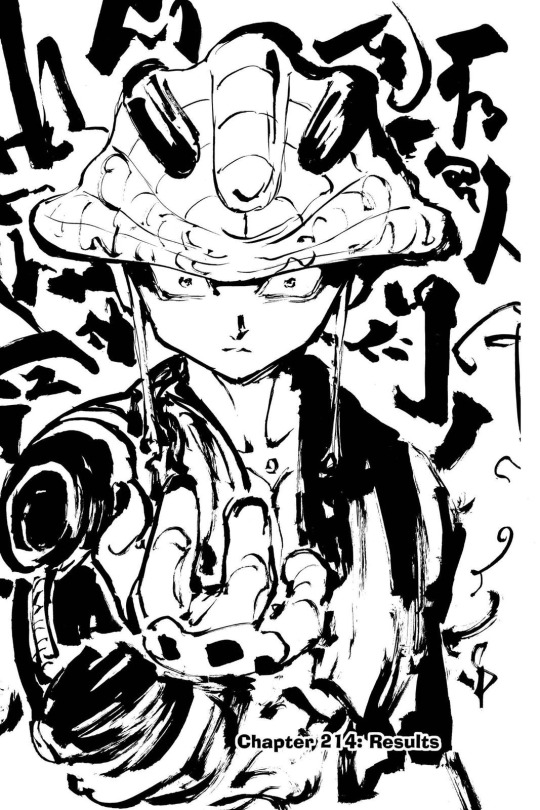
YES HIM
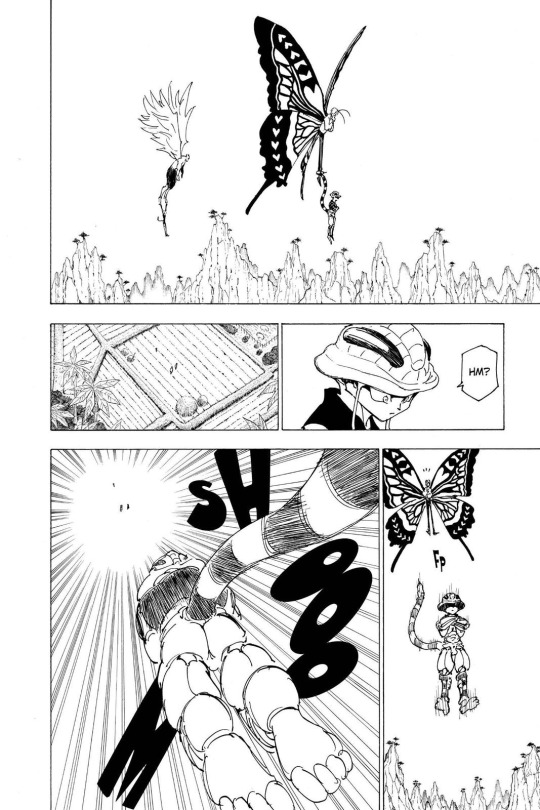
URGH not this scene
Shaiapouf’s wings may look good I’m not ready
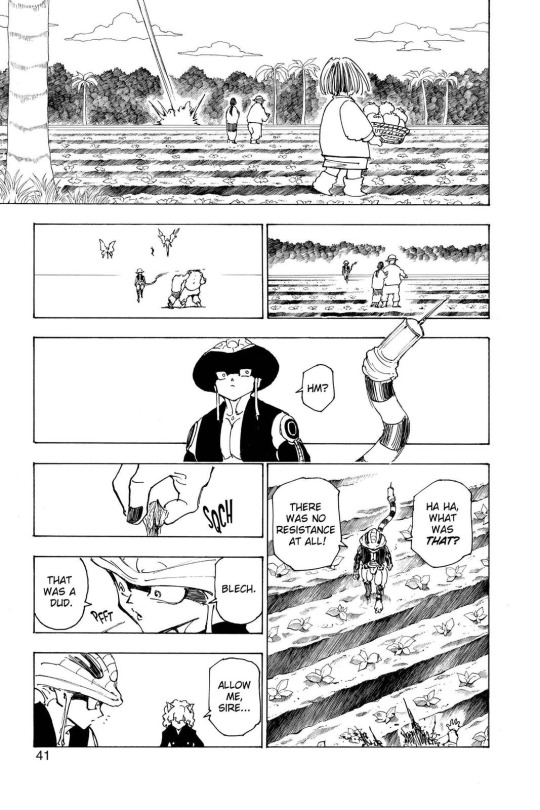
POOF No head, no smoke nor mirror here ladies and gents
anyway
poor kid
At least they didn’t suffer
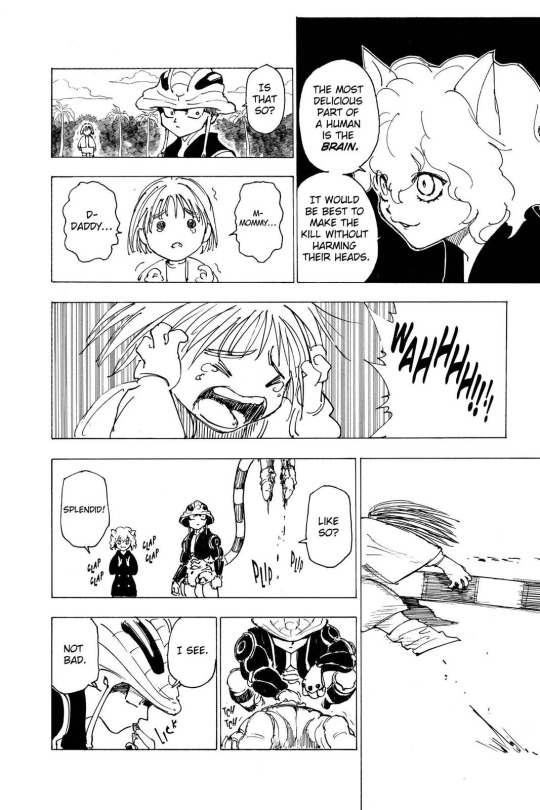
Even if you strike the heart, death is not instant
poor kid
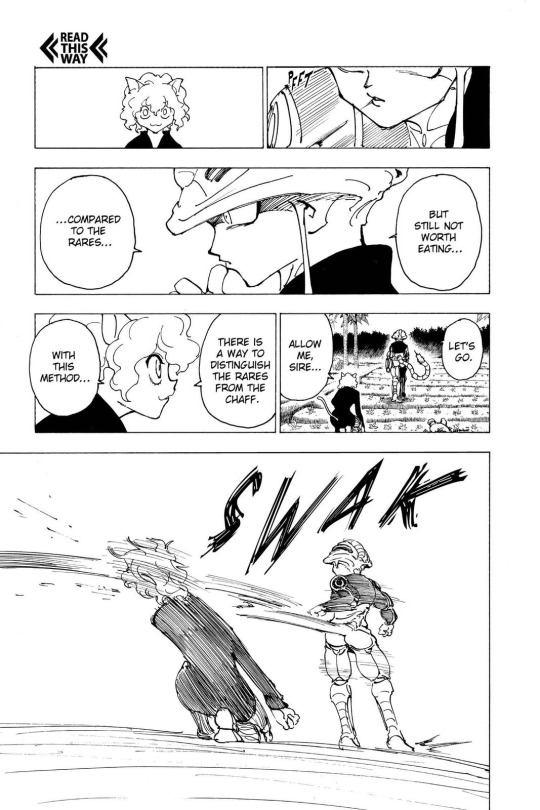
ASSHOLE
first you kill stuff and then waste food because of your bad taste
try cooking and using spices first
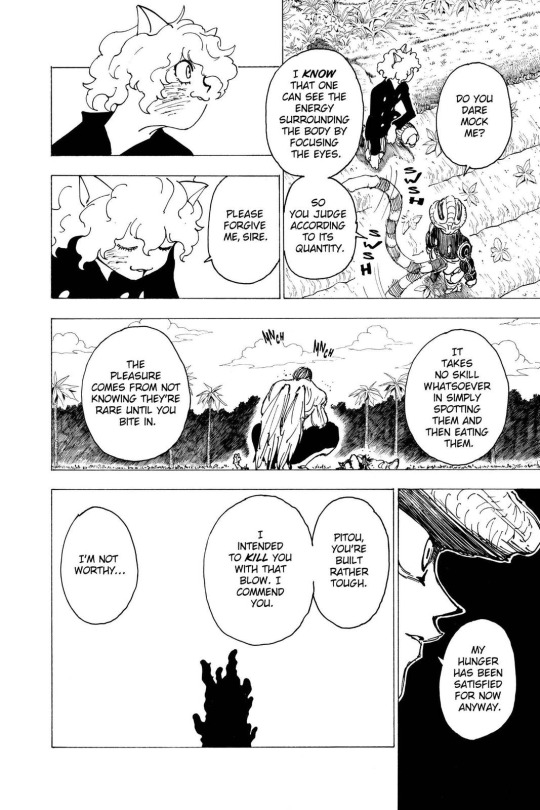
The royal guards are durable and would be hard to kill even for the King
provided they actually want to resist him killing them which I doubt
Using Gyo isn’t sufficient for all nen users too
Some of them can hide it by controlling their aura flow
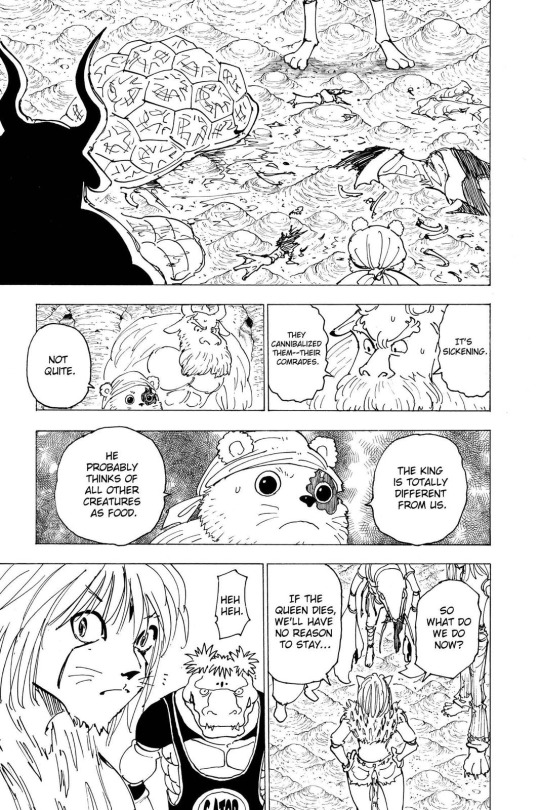
Here is a taste of your own medicine
Bihorn is communist too, good to know, he and his comrads shall be safe if he behave, the revolution is nigh
The chimera ants are also not british, as soon as their queen dies, they abscond : “no : long live King Charles here”
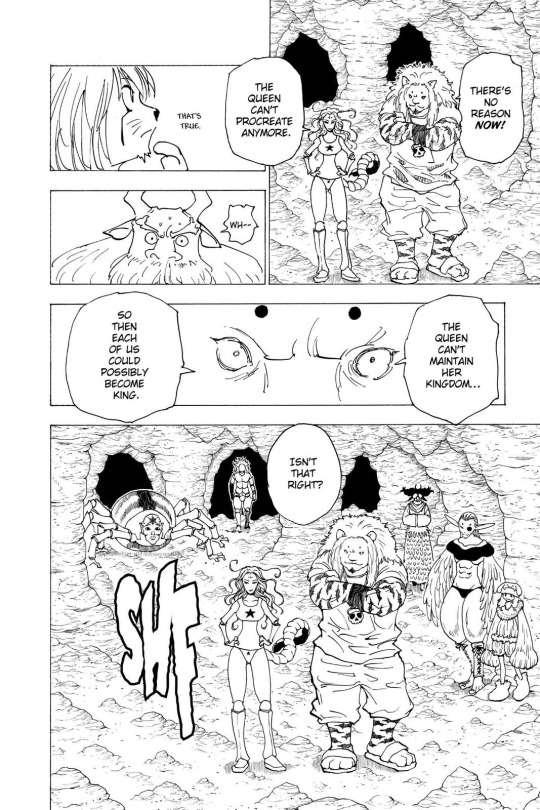
When have you invented misogyny ? Unless you’re terfs and you just don’t like the only cis women who could procreate here ? Like, you only like women with working wombs and if not, they need to be able to fight ?
I have always headcannoned that all of them becoming kings is gender affirming Zazan could become a King too even if it’s not what she chose, she’s truly a trans Queen (literally)
I’m not really up to date in my knowledge of ants. I think most soldiers are usually diploid females (two copies of their genomes like us : thanks mom and dad) like with bees, males are usually haploid.
Most chimera ants appear male and are apparently able to reproduce like the King so by insemination. That role is typically male but not always like in at least one species of mosquitos where female have an appendage that penetrates the male and basically absorbs the semen.
Anyway CA might have some complications due to foreign genetic interference and horizontal transfers might be the reason most of its species workers are male. maybe sometimes it fucks up and you get females or maybe they just appear to have female characteristics of other species.
Most ants should have intersex variations to considering they also have interspecies variations like Leol here who is a mix of a tiger and a lion. In his case sex determination should be quite complementary between different mammals from the same family. Maybe not
Sorry : that’s what doing a PhD on plants sex chromosomes does to you
be careful
though I’d love to get my hands on such a species to analyze
must be very interesting how sex works in this individuals.
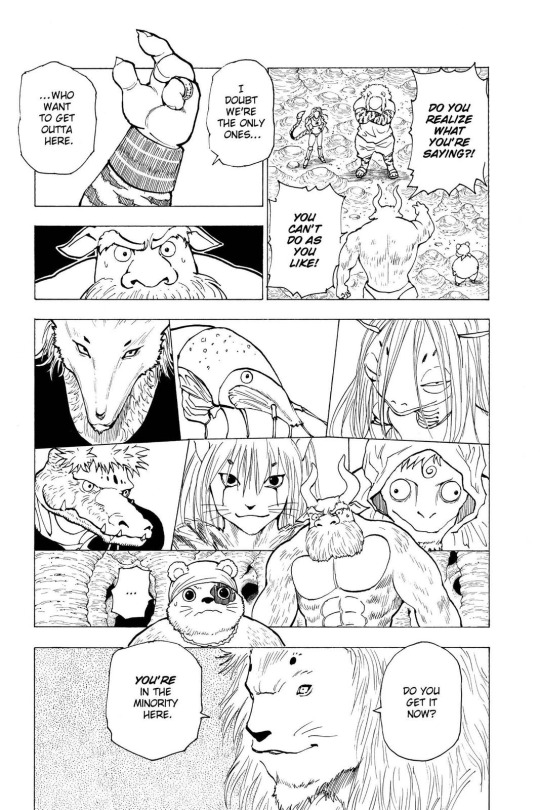
Then leave
especially mantis looking ant right there we’ll never see again
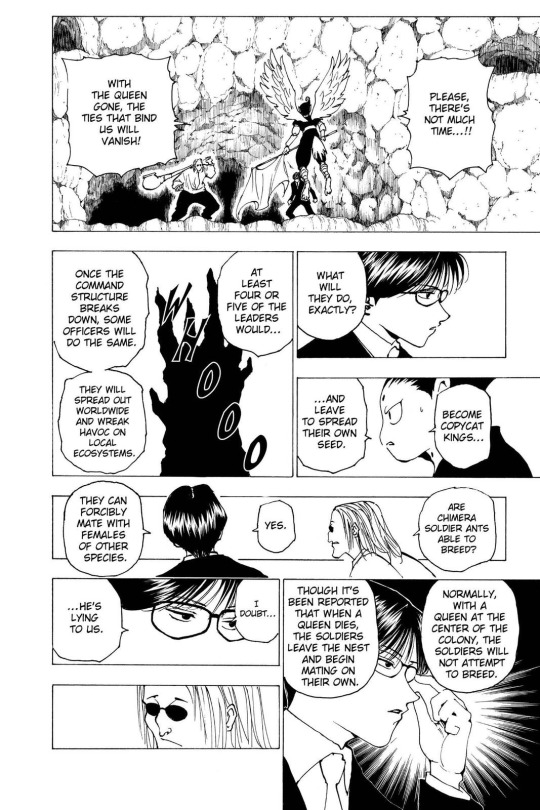
SEE
all of them can become Kings, I bet Zazan is an intersex queen and she chose to be a queen instead of a king
I mean Togashi likes to sprinkle gender non conformity here and there since his beginnings
his wife Naoko Takeuchi does this too
They can be clumsy at times but their attempts to have a diverse and human cast of characters always made me so happy
I’m still sad Trouble quartet is not a thing
I mean a manga about crossdressing gay footballers (soccer players for our fellow statesians) by Togashi would be fire
Level E is pretty fun too, I definitely recommend it and it has one of the most fire openings out there
Yu Yu Hakusho is just sooooo good and proto HxH, you can see the influence from older nekketsu shounen like DB and Jojo’s but also how it influenced Naruto and Bleach (just the beginning is a bit slow but it builds up like Bleach, with short stories at the beginning ending up in a full tournament arc)
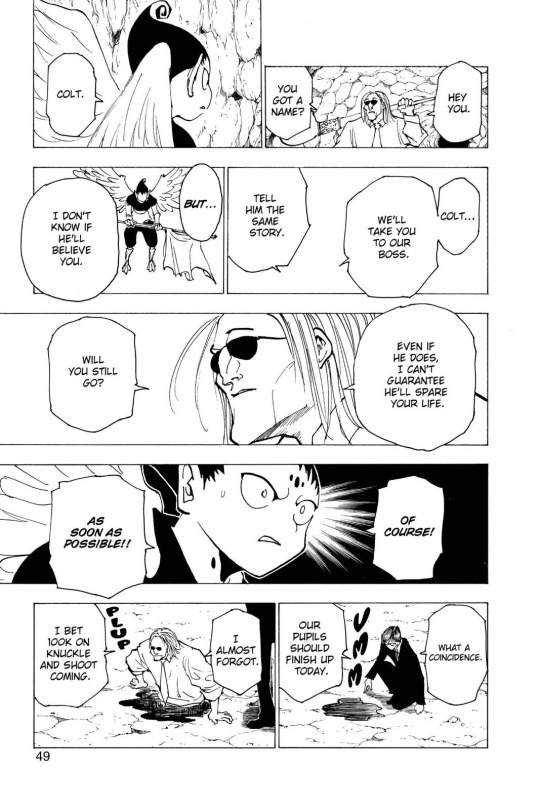
I love Colt
we never talk enough about him, he must have a nice hatsu too, I’d like to see it, we need more out of the box enhancers.
A flying enhancers is already quite an annoying opponent
I hope we see more of him in the future
THE BET
yes Morel bet safely on his own pupils, the safest bet considering Gon and Killua’s strength when he saw them
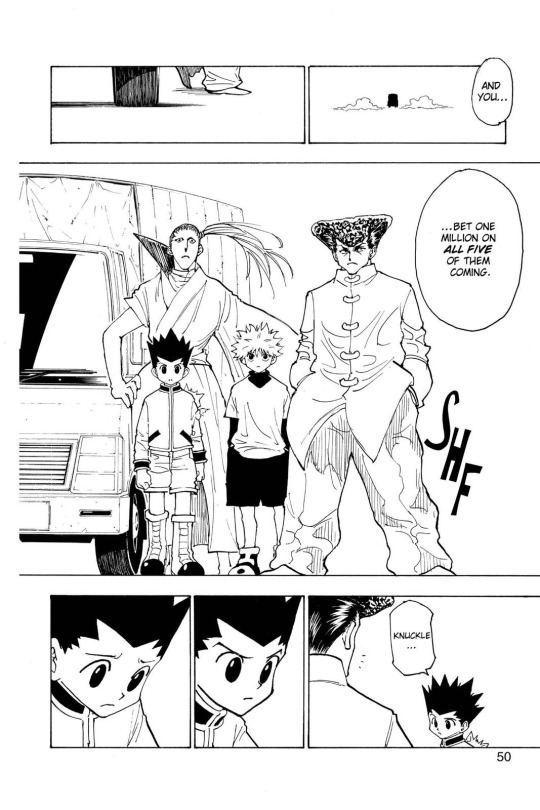
but Knov likes to take risks
AND THEY BOTH LOST HAHAHAHAHAAH
four of them, not five
That panel is so good too
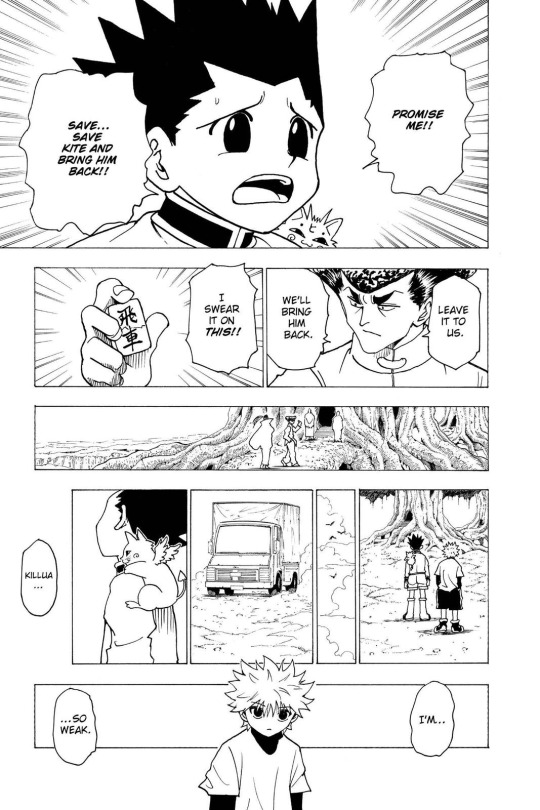
It’s alright, we can trust Knuckle, he’s a dependable man
but you’re making me tear up Gon
I know how frustrating weakness can be, lack of control, lack of power over your life
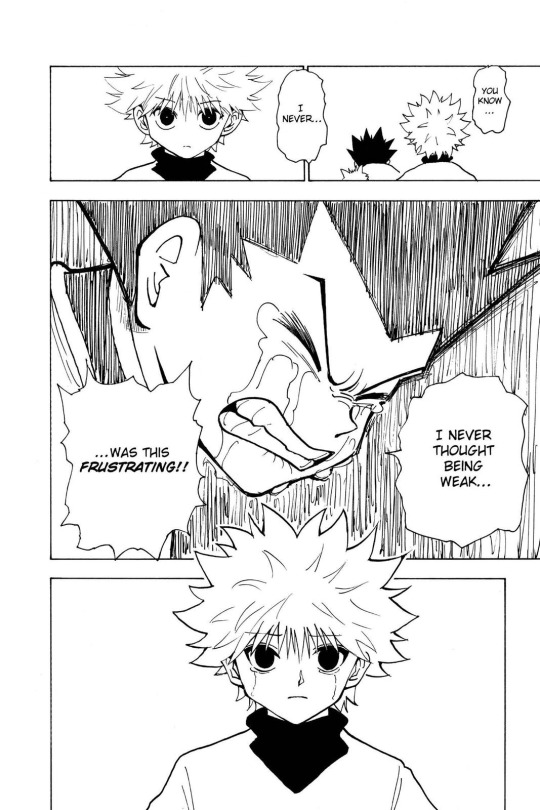
CRYING
I KNOW
Poor Killua
this means something even worse for him
he can relate too despite being very strong
he’s never been strong in a way that allows living your own life and following your own path
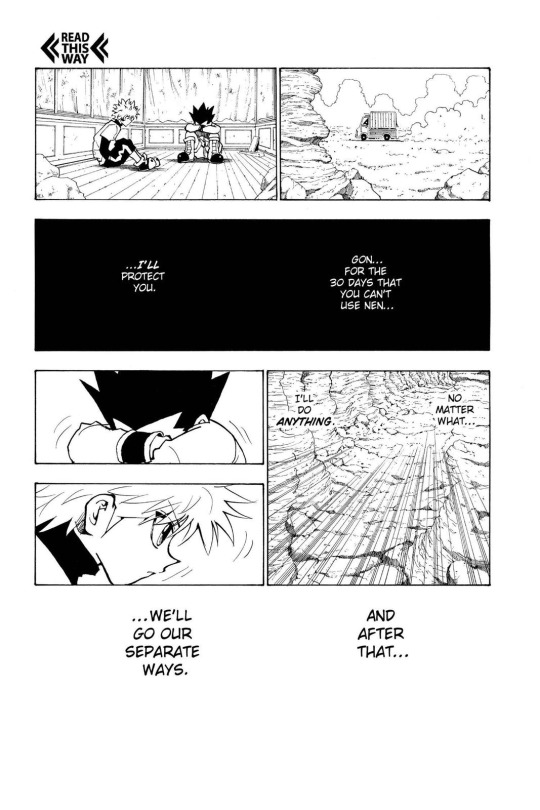
HIS PROMISE TO BISCUIT NOOOOOOO
Killua really tries
he’s gone so far but he has yet to reach a point where he’s confident in himself
it’s alright my boy, Gon also has to grow
You’re 13 damn it
I’m not sure I’ll be able to liveblog again today
this ended up taking quite some time
Have a nice saturday !
5 notes
·
View notes
Text
comparative post abt supernatural and revolutionary girl utena :( tw for incest, csa, abuse, and a brief mention of suicide. Also, spoilers for rgu.
supernatural and revolutionary girl utena (the anime. i havent seen the movie or read the manga this post is abt the show only) hit a lot of the same thematic notes and it is really striking because supernatural seems to hit them by accident and ends up with a totally different conclusion and when you compare it to rgu actually ends up endorsing everything that rgu criticized.
revolutionary girl utena is a surrealist show about ohtori academy, which is removed from reality and controlled by a godlike figure, akio. akio maintains his own power through grooming the students in his care and having them reproduce power dynamics, namely the system of gender, through abuse, violence, and bullying. akio sexually abuses his own younger sister, anthy, and multiple other students over the course of the show, and in turn, boys in attendance at this school learn abusive patterns of behavior while girls are conditioned to accept them. the key themes of the show are cycles of abuse, violence in gender roles, and the way interpersonal gender-based abuse feeds into the larger system of gender and misogyny and vice versa. the fact that ohtori is so removed from reality, that all the fighting and abuse that takes place inside of it is isolated from the "real world," is important; extremely stringent gender roles are reified as natural and necessary, as is akio's power, despite the fact both are social constructs.
surface level, supernatural couldn't be more different, yeah. but it actually does hit similar notes: the system of hunting is removed from the "real world," and although the characters tend to weave between the supernatural and normal worlds, there is always a level of separation between them and normalcy, there's always the sense that the supernatural world is almost entirely distinct from the normal one. even when they do mix, the subplot is resolved, and by the next episode or the next season the mix is forgotten about, as if the real world had never been touched by the supernatural at all. it is considered of paramount importance that "normal people" are never told about hunting but never explained why (this rule, at least originally, is made by john. an abusive figure of authority making arbitrary rules of isolation to control the children in his charge? hm.)
this level of isolation between the supernatural and the "real world" helps to reify the concept of monstrosity itself: within the world of hunting, anything other than human is a monster, even though these definitions are constantly shifting and the consequences for monstrosity change frequently. we are shown over and over again, textually, that there are many many sentient monsters with thoughts and feelings and emotions and needs and desires, who are just as morally complex as any human beings, but most of them end up under the control of hunters or exterminated anyway. why IS a monster a monster? the separation of hunting from normalcy serves to keep people from asking that question. the system of hunting is so entrenched in the world of the supernatural, and the world of the supernatural is so separated from normalcy, that the concept of monstrosity is considered to be natural and necessary. where a "normal" person might ask why those vampires in 'last holiday' had to be killed bc they didn't really do anything wrong on screen, hunters know that monsters need to die because that's the rules of the supernatural world.
in rgu, akio maintains his control of ohtori through the hierarchy of gender. that's how the school is structured, with boys playing a specific role and girls playing the counterpart role. akio needs that system, because it's what facilitates his abuse of anthy, and his abuse of anthy (and similar relationships where boys abuse girls and more specifically brothers abuse sisters) is what gives the rest of the system permission to continue existing. touga grooms and later sexually assaults his younger sister nanami. touga is a human child, no older than 16 years old, and was himself groomed by akio and the system in which he lives. his abuse of nanami is a manifestation of that system. these abusive relationships allow and are allowed by the system. at the end of the show, utena and anthy, two girls abused by akio, help one another escape not only their abuser but the school which permitted and fed off of their abuse. their escape doesn't destroy akio or ohtori or the system as a whole, but it puts a crack in it. it serves as a example to other abused children, and offers a path to healing. overall, its a genuinely impactful story about how gendered abuse happens, how damaging sibling abuse and incest is, and how a system of power both facilitates and depends upon abusive relationships happening within it.
the interesting thing about this is that supernatural's system of power is different (monsters and humans instead of girls and boys), but it's also enforced in similar ways by the god figure (well. the literal biblical god, actually. chuck.) in supernatural. monsters and human beings are divinely separated both in the afterlife (despite the arbitrary nature of the difference between them) and on earth (chuck has written down everything ahead of time, especially surrounding the protagonist hunters and their way of life). sam is established very early on to be monstrous, first because of the demon blood, then as lucifer's chosen vessel, later as soulless. each time, he needs to be brought back under human/hunter control, meaning dean's control. dean's authority over sam (and later his abuse of him) is in part a manifestation of the accepted power dynamic of hunter over monster, which is established at the beginning of season 2 when john tells dean that he might have to kill sam if he becomes a monster.
in rgu, the only acceptable male-female dynamic is controller and controlled, protector and protected, abuser and abused. women can only be witches, like anthy, or princesses, like nanami. in supernatural, the only acceptable human-monster dynamic is the same. monsters can only be 1. dead, or 2. under the control or supervision of a human/hunter. most end up dead, of course, but sam was always under the supervision of dean. it's at dean's discretion whether or not to kill sam in season 2, it's dean who's trying to get control of sam all through seasons 4 and 6. because of sam's self hatred about his monstrosity and "disappointing dean," he nearly kills himself at the end of season 8, and dean again makes major decisions for sam. the imbalanced dynamic between them is in large part because sam's humanity is always in question, and it's always up to dean to protect him, to control him, to put him down if need be. in supernatural, the imbalanced relationship btwn sam and dean is facilitated by the rules of the supernatural world, and it is because they can't break out of this power imbalance that they are so completely incapable of rethinking the system of hunting.
of course, it isn't 100% dean's fault. he was given the responsibility of Sam by john and by the bigger system of hunting. touga was groomed and most likely abused by akio, and it was only in imitation and admiration of akio that he abused nanami in the first place. in the context of hunting, it's dean's job to do harm, because that's the job that's been assigned to him by his father, the larger power system, and chuck. he was abused, and he also suffers by being forced into this role- he can't really connect with the people he cares about in a meaningful way. that's how the cycle continues.
the weird difference between the two? the system of hunting is never actually criticized, and the relationship between dean and sam is never addressed as abuse. so while revolutionary girl utena is a thoughtful and compassionate exploration of sibling abuse and gender, supernatural is a hamfisted action story that validates unhealthy family dynamics and eugenicist ideas about "monsters" that aren't really monsters at all. so at the end of rgu, utena and anthy break free of ohtori and akio. they end the cycles of abuse and are finally able to see each other outside of the roles prescribed to them by an abusive system. at the end of supernatural, the cycle isn't broken, the idea of monstrosity remains unrefuted, and sam and dean never see each other any differently than they always have.
#posts only i care about#incest tw#csa tw#abuse tw#all the incest/csa stuff is about rgu not spn#i genuinely might delete this soon cuz i dont want to imply something i dont mean by comparing the two#but i think i was clear enough that that wont be an issue#anyways!#txt
19 notes
·
View notes
Text
JAIRA IVY BLACK + random headcanons i’ve gathered over the years.
i’ve been writing jaira since late 2016, these are all just hc’s and things i came up with but was too shy to post lolol. establishing trigger warnings for mentions of: violence, death, illnesses (both temporary and chronic), misogyny, mild discussion of gender / gender roles, pregnancy, mental illnesses, g*nocide (sort of???), c*lt like behavior, and more death. vampire stories are not happy stories, y’all.

for reasons unknown, i’ve always sort of played with the idea that jaira’s inevitable death was something that wound up foreshadowing itself through her life. at first it was going to be like, stupid little obvious drops like one of minnie’s favorite novels happened to be nosferatu or something. horror stories just intrigued her, almost as much as baldwin novels or hughes poetry did. but that was also like...too obvious. (i mean, she probably did like the horror genre to a degree & ate mary shelley’s frankenstein up.)
continued toying with said idea led me to come up with the semi-solid fact that minnie was actually a very ill baby. she was struck with fever in infancy and had a very short life expectancy of a few weeks. both of her parents were devastated. her mother already suffered miscarriages, they were preparing to bury their only child as soon as she’d been born. plus, this was literally 1900, so it wasn’t an uncommon thing for babies to fall so ill in infancy. but somehow, minnie survived, and her life continued moderately normal. still with a weakened immune system due to what the fever did to her and susceptible to other illnesses that science would eventually find vaccines for, but her life was relatively unchanged before her death.
jaira’s ‘death’ at twenty two years old / subsequent turning gave her the appearance of permanent youth. which she finds annoying. plus it got her into some pretty traumatizing situations because in her early naivete, she was often dismissed, belittled, taken advantage of and straight up put into danger. i’m talking grown ass men screaming blue in the face and physically striking her for simply thinking she was smarter than them. (she was. she had some college education and did apprenticing to be a seamstress by the time she’d passed away and made excellent marks in her studies.) but don’t worry, she no longer looks like twenty two year old minnie. natural scarring and pollution now makes jaira look a smooth thirty. sometimes she even gets mistaken for twenty five.
turning was a painful experience. 0/10 would never recommend. it is not nearly as poetic or sexy as literature and art make it seem. it is messy and bloody and terrifying and awful and painful and death. it is also a very long process. she literally never saw her parents or immediate family ever again, as after her ‘funeral’, her parents left new york city in their grief and each died of natural causes later in their lives. if they heard about a woman named minnie o’day performing in harlem’s jazz clubs and overseas, they wrote it off as coincidence.
this lines up with something else i came up with some time ago: there is a clear distinction to me between pure born vampires and human beings who have been turned into vampires. not only from a power-based standpoint but a biological one as well. (not to say that turned vampires don’t have powers and enhancements, bc they absolutely do. jaira specifically has super strength, accelerated healing of new injuries only — meaning, the injuries of her car accident do not & will never heal ever, enhanced senses of smell, sight and hearing, some increase in speed that unfortunately doesn’t measure to that of purebreds, telepathic abilities such as the ability to both read and speak into one’s mind, and if she concentrates hard enough she can levitate. but she only really uses levitation if she can’t get to sleep.) whereas vampires born as such were never really explained as having much physiology, humans turned into vampires kind of...are at a standstill to me. their organs, while not entirely dead, just sort of are stuck in more or less the same state they once were in. this means that while their hearts are not actively beating and the blood in their body is sort of just clotted mush at this point, not everything is done for.
(and from the perspective of writing vampires who are also women, such as sam’raa ebadi being a purely born vampire vs. jaira being a human previously, i like to think that while there’s obviously no active menstruation going on, that doesn’t exactly equate to menopause per se. the shit is still there, just turned off. there’s still all of the proper hormones and eggs and whatnot at a stagnant. but things like pregnancy rely on body temperature more than a state of living for me. and since turned vampires no longer have an internal temperature, they have to regulate this themselves externally. this made up a lot of jaira’s later feelings regarding her gender, especially raised up and taught with a completely different outlook of what femininity meant, she often felt frustrated and disillusioned because she is not like other women and she will never be. cue thoughts of: am i even a woman? i was taught what this meant for me but it will never be the same as it once was. i look like a woman but am i really a woman? if i don’t fit the expectations once given to me? what am i? while these thoughts no longer bother her, she is very much sort of disconnected of what she believed were societal expectations for being a feminine woman. she’s too old for this.)
i also believe that humans with comorbidities who were turned into vampires will still retain some of those traits. for example: a human with diabetic retinopathy that is turned into a vampire, while having slight enhanced visions from the biological change, still will have decreased vision based on how damaged their sight was to begin with, which in turn affects the way they hunt compared to a purebred vampire with all enhancements and no morbidities; or a human that is deaf prior to being turned still remains deaf, but with other enhanced senses such as sight or smell or movement that another human would not have. this is also why a lot of jaira’s early chronic pain via the fatal car accident as minnie is retained in her enhanced body, why she still has scarring and body pain, and why turned vampires in general experience increased vulnerability and weakness closer to their body’s death date. they’re not the same kind of enhanced creatures as vampires are; they’re just semi-functional dead bodies.
i never came up with a name for luciano’s cult. mainly because he’s no longer present in her life anyway and jaira has not fully committed to trying to kill him & the rest of the members. i just know that their goal was this weird, fucked up sort of ideology of humans being weaker and lesser than, and must be converted or otherwise exterminated in order to face the true dangers of the world. accomplishing this goal meant scouring the globe and preying on the dying by offering them eternal life in exchange for...well, everything they have. they may even manipulate and intentionally cause life threatening injury to acquire those they are particularly interested in. those who they don’t view as ‘worthy’ of this exchange are just simply eliminated. they also like to populate via vampire ‘children’ (those who are turned + those who happen to give birth to vampire hybrids), preferring those with more affinity of vampire traits than those without. so uhhh yeah. not elaborating any more on that bc it made my brain hurt.
jaira fled said cult in around 1970 after one too many acts of brutal violence and overall atrocity that unnerved her the more she realized their goal was less about helping people live and more about eliminating humans entirely. jaira does not talk about her time with them. she does not talk very much about her relationship with luciano, the humans they’ve killed, the hybrids she helped populate or the trauma and borderline PTSD this has given her. unless they happen to know who she is to them & come to her first, she does not seek out her hybrid children (or even subsequent grandchildren); in fact, the only child she acknowledges despite the estranged relationship is her daughter flora with her first husband ebenezer, born in 1956. (fyi: ebenezer is a seemingly immortal shifter who’s been around since the 1800′s and their daughter flora stopped physically and biologically aging past her 20th birthday. he owns a bakery in chicago. flora helps him run it.)
but on a lighter fuckin’ note. jaira, being a turned vampire and not a pure one, did show up in photographs at one point. given that 19th century cameras were the kind where you had to stay extremely still for and had a slight fuzziness to them, jaira is able to appear on some film cameras and the early 20th century flash bulb cameras because 1. i learned a few years ago that the easiest way to tell if a person was living or dead in an old photo is if the photo is super clear. bc they’re dead. so they’re still. 2. jaira...technically doesn’t have to breathe? like she does it out of habit at this point but it’s not necessary for her to breathe so she is able to sit still without moving. 3. while she ‘shows up’, it still is not a crystal clear image. when the film is processed, any photo of her / with her in it will appear hazy or with distorted looking orbs around her, and she looks almost faded in pictures. very freaky. she does not, however, show up on digital cameras or cell phone cameras bc uh............hm.............never cared to think abt it further than that. whoops lol
i wrote this somewhere actually but jaira is still a traditional vampire in the sense that you have to let her in. i remember this bc i unintentionally wrote in a thread for her once that she stood outside a love interest’s door and didn’t / couldn’t go in until he physically pulled her into the room. (said old thread with @blackplanct is here if anyone wants to be nosy) she is also a traditional vampire in the sense that she hadn’t seen her reflection in nearly a century until they started making aluminum backed mirrors and it scared the shit out of her to see herself in real time. and she is alsoalso a traditional vampire in the sense that, if she’s getting on your nerves? being too violent? don’t wanna let her in bc you’re suspicious of her? drop some rice grains on the floor and she’ll irritatingly count those bad boys up. bonus delayed time if you mess up her count and she has to start back over.
so i’ve never actually contemplated a sort of au of jaira being a human instead. it just feels unrealistic, tbh??? however, if i do choose to write a modern / human verse for jaira for those who think this vampire shit is just...Too Much to contemplate, i’d like to think her life would be relatively unchanged from what it was meant to be during the 1920s — she would have been a seamstress, likely taking over her mother’s showing shop or eventually owning her own clothing store. she still would have married (and prbly still have divorced) ebenezer & had flora, the only change being that flora doesn’t hate jaira as much and she would likely be jaira’s only child. or if i wanted to keep it spicy, she still would be involved in private investigating or some sort of morally ambiguous work or smthn of the sorts. so that is an option on the table if at all necessary.
i will likely make additions / revisions to these at some point or even entirely axe them, who knows. but again these are everything i’ve theorized or vaguely mentioned in memes or threads from like early 2017 to now in 2021. we are also open for plotting & connections, because this old ass lady basically knows everyone over 50 within nyc.
#jaira — facts#long post tw#every time i make long hc posts its like. wow i hate everything abt this actually#i am not opposed to being beat up over this#will i prbly fall in love w it like i did with that one ilyssa hc post that one time? yes most likely#but right now its like. where is the coherence girl#u are on an entirely different plane of existence no one wants to be on and its very hot of you @me
4 notes
·
View notes
Text

(Due to the topics discussed, this post includes general spoilers for: the Shades of Magic series, the Grisha Trilogy, the Six of Crows duology, Deathless, The Bear and the Nightingale, The Priory of the Orange Tree, Jonathan Strange & Mr Norrell as well as the Yukibana no Tora manga.)
Book after book, especially in fantasy, one might come across a similar situation: daring plots, grandiose characters, extensive worldbuilding… until it concerns women. Then, all creativity goes to the drain, reusing the same tropes, the same caricatures of how a woman behaves and where her rightful place is – a supportive aside to the main characters’ journey, absent, if not outright dead. Such criticism is often levelled at male writers, their lack of effort, their fetishes obvious. Yet what of female authors?
Women, it is said, do not fall into the same traps as men and create complex male characters with more passion than any man will spare for a female one. Do they, thus, honour their fictional counterparts in kind? Would reading women be the solution to the neverending waves of stereotyped heroines and love interests?
Unfortunately, we found ourselves confronted to the same rancid ideas in books authored by women. Too often, their characters oscillate between virginity and depravity, eternal victimhood and stupidity. Vapid and vain, or weeping and weak, or sweet and pure, all to better "defile" them later; their personality barely sketched in the sidelines, their existence hardly worth a mention, their life trivial, sacrificed. Thus appears a string of familiar figures: the dead idealised mother, the living but children-fixated mother, weak, crying; the shallow, beauty obsessed queens and girls, stupid and selfish to the core; the beloved sisters and relatives, abused and killed to distress the male half of their family; the missing female friends and aunts and grandmothers and passersby, the women whose very presence is omitted, repeatedly.
This listing may have triggered a few memories, especially to readers familiar with young adult literature, but let’s be specific: do you recall the few appearing girls derided by Lila Bard, in Schwab’s Shades of Magic series? The queen, always afraid and weeping, having no life outside of her fears and her son? Perhaps, if you persisted until the last volume, you also assisted, powerless, to the systematic abuse and slaughter of every other female character while men mourned?
Or maybe have you picked up Bardugo’s first fantasy series, The Grisha Trilogy, with its vain and unnamed Ravkan queen, its most beautiful woman punished with ugliness, its villain’s mother sacrificing herself for her son and disdaining her daughter? Or were you more interested in her later additions to her universe, Six of Crows, with its dead or mad mothers, its silly and grating young wife to a much older man, its manipulated girl-assassin finding no common grounds with her female rival, only death?
Have you opened Arden’s The Bear and the Nightingale and felt dismayed at the lack of care towards Vasya’s sister, sent away at a young age to marry and breed? At the upsetting and unending sexual suffering of a not that much older stepmother, turned bitter and cruel, demeaned despite her resemblance to the heroine, worthy of no compassion?
Perhaps you might have perused Valente’s Deathless where Baba Yaga is portrayed as a bitter old crone expressing sexual jealousy of Marya, espousing views such as a wife’s role is to be a “good mount for her husband”? Her enslavement of the previous Yelenas who were used up and cast aside as Koschei’s sexual playthings (and even more swiftly discarded by the narrative) with Marya giving only a fleeting thought to their plight?
Or Clarke’s Jonathan Strange & Mr Norrell wherein a female perspective is conspicuously absent, existing only to be dutiful wives or hapless victims caught in a powerplay between magical men and maleficent fairies?
It would seem only a few chosen women and girls can be in the spotlight. These, usually, take the mantle of "heroines", though, as we noticed, female authors will still not allow them the same latitude as men. Stuck in a man-made world, they must submit to their gazes still, solely rely on them for friendship, love, knowledge and general plot advancement; with their every interaction tied to them, they, too, see their development denied in favour of the men’s. They must shrink themselves, give up on their ambitions, their ambiguity, accept a society designed entirely against them and feel grateful for the scraps of freedom graciously ceded to them. In that sense, they resemble very much the other girls they often strive to detach themselves from.
You may have noticed, in The Bear and the Nightingale, how Vasya, a young girl of fourteen, cannot escape the gaze of a lustful priest, the very narration also espousing his point of view, decentering her. Magic may allow her a way out of forced unions and pregnancies, yet still misogyny weights her down, isolating her from other girls and women, like her stepmother.
You may also have come across the various threats of rape Lila Bard must endure, her cross-dressing to prevent this, her loneliness and contempt for the members of her own sex. You may have noted her ambition and recklessness, only to see it crumble before a male character’s tragic backstory, while her very own desires and excessiveness were handwaved amidst a plot focusing on temptation.
Or you may have seen, in the pages of the manga Yukibana no Tora, a bold female warlord overcome her discomfort with men by ordering a friend to "take" her, turning herself into a passive recipient for men’s sexuality. Her life experience and thus, her differing point of view and confidence in herself is completely swept away. Even in a fictionalised account of her life, she must yield to men’s degrading view of her body.
In fact, despite the infinite possibilities offered by fantasy, many women still build cultures infused with conservatism. Traditional gender roles remain enforced in appearances: makeup, dresses, thinness and not a hint of masculinity, which would prove a stain, an assumed hatred against femininity and its unlucky subjects. Society, in such worlds, favours harmless and nurturing soon-to-be mothers, emotional and lesser girls whose value lies in the marriage they will be able to secure. Bloodlines, powers, knowledge and divinity itself all belong to men in an unquestioned misogynistic realm. Female characters must struggle against the chains of sexism before undergoing any other kind of development, if they benefit from such an arc at all. Rape, pregnancy and misery is their lot.
Take a look, then, at the rulers as well as the extras populating these worlds: men, in Schwab’s, as king, guards or nameless sailors, dressed as such, that is, without dresses; men as rulers again in Bardugo’s, as merchants, as mobsters, while women obsess over their appearances.
Samantha Shannon’s Priory of the Orange Tree presents a striking example of a world still conceived by men: in a country ruled by women for over a millennium, producing a blood-related heiress remains such a primordial task that even a queen becomes a broodmare. Forced into marriage, her character endures unwanted sexual unions until she finally assumes her goal as a woman – a mother, through and through. Reverse the roles, parse history: royal men annulled their marriages, kept mistresses, adopted heirs… and yet, and yet. Fictional women are kept on a tight leash. What a waste of creativity!
Disappointing and frustrating, yes. Even moreso as many reviewers – including women – will gloss over such issues, when they do not misconstruct a lone strong heroine as feminist-worthy, or qualify a superficially egalitarian world as "matriarchal". Yet what bothers us further is the way these authors receive a constantly harsher treatment than their male peers, their works immediately ridiculed and their intents disregarded, however flawed they could be. Despite their failings, men’s works are still deserving of an analysis, of some doubts and nebulous improvements; women’s should be denounced and go back to the garbage bin.
The books evoked in this post aren’t to be thrown out and dismissed. They, too, had commentaries and themes that we may disagree with, that we may believe unfortunate, or short-sighted; they had their stylistic failures beyond sexism, their convoluted plots, their lacking arcs; their moments of brilliance and artistry, their moving scenes, their heroines still shining, despite it all. Hence this blog: a space focusing on women in women’s works, neither absolving them of criticism nor disregarding them completely. We want to inspire discussions, not irredeemably condemn… and, hopefully, spark a few ideas.
#writeblr#booklr#shades of magic#the grisha trilogy#six of crows#the bear and the nightingale#the priory of the orange tree#deathless#jonathan strange and mr norrell#yukibana no tora#our posts
59 notes
·
View notes
Text
I was thinking about Nimue and critiques I’ve seen of her, and that I have as well, most of which revolve around her being seen as suffering a bit from Heroic Strong Female Lead. So, a bit shallow on depth of character, moments that strike one as unrealistic etc. etc.
Anyway, ran across an older post that discusses the whole thing around female (and minority in general) power fantasies. And there was an addition that I think is super relevant:
So, there’s this interesting thing where a certain degree of saturation in stories will train the audience to just accept stuff that’d normally strike them as bizarre or unrealistic, and move on without questioning it. It’s sort of like ‘willing suspension of disbelief’, except that phrasing doesn’t really encapsulate it precisely. It’s more like… commonality breeds acceptance.
For example, a humble young boy who rises to prominence and becomes a hero is such a standard piece of storytelling, that virtually no one ever sits down to watch a movie and actually goes ‘well, but, this is just a young farm lad - surely he can’t do a single thing to help stop the Forces of Evil!’ People in the movie might do that. But unless the audience is very, very young, or has somehow managed to avoid most books, movies, songs, comics, television shows, and oral traditions for the whole of their life, they’re going to sit down and think ‘ah yes, here’s our guy’.
Even though, in real life, it actually IS still pretty far-fetched for Ye Humble Village Lad to turn out to be the only thing standing between mankind and destruction.
The interesting thing, though, is that if you change enough elements of what is so common as to be thoughtlessly accepted, the image you present will no longer resemble the familiar narrative. Even if, below the surface, the other components are exactly the same.
This, along with the above-mentioned misogyny, is another contributing factor to the Mary Sue thing.
Because there are fewer female heroes who are just unabashed power fantasies, embodying unlikely rises to success or mastery of untold skills, if you take a very typical story that stars a dude and swap him out for a lady, the elements once rendered invisible by familiarity, are now noticeable again. The audience is jolted out of complacency, and begins to think more critically about what they’re being asked to believe. (You can accomplish the same thing with other demographics, too, i.e. putting characters of colour in roles typically given to white actors, or having LGBT+ characters with the same abundance as straight ones, and so on and so forth.)
So even people who like to think of themselves as totally fair and unprejudiced can end up enforcing double-standards in entertainment. Because if you don’t catch yourself, you will not even realize that you managed to sit through three Iron Man movies without ever questioning the premise of Tony Stark’s genius, but somehow Shuri in Black Panther just struck you as ‘unrealistic’.
[Full Post for reference]
Because this is focused on Nimue, and not Arthur (or another knight of the round table, as we are generally used to seeing), those tropes around “strong leader finds magical item that secures their already clear right to leadership” and “humble to hero” are glaringly obvious. Had it been a show about Arthur, I’m not sure we’d have as much discussion around it.
It’s something I also see in comparison to Weeping Monk | Lancelot who has considerably less character development than Nimue. All of his basically comes in 2/3 scenes in the ninth episode and 2/3 scenes in the finale. Compared to Nimue who we have gotten to know over the course of all 10 episodes. But I know I’ve raised his lack of depth as something that makes it hard for me to find him interesting and people have rebutted with “well no, i think he’s got plenty of depth/has got some characterization happening” etc. and that’s not supported really, by the show.
The text, if we want to call the show that, demonstrates the opposite. This isn’t to say you can’t like or enjoy the Weeping Monk, it’s just to say there’s a reason his glaring lack of depth is brushed over while people spend time analyzing Nimue’s. And it’s because we’re used to seeing the Strong Silent Mysterious Male trope. In terms of villains with depth, Iris and Carden have more going on. But the Weeping Monk fits, in one degree, a power fantasy we’re used to seeing.
In addition, compared to Nimue, Weeping monk is more of a blank slate which makes him easier to project onto. Which is half the point of how these unrealistic power fantasies work. Nimue allows that to a certain degree, she’s bland enough I think a lot of people could read themselves onto her. But she’s got just enough characterization, just enough back story, where she’s not a tabula rasa.
Anyway, this show is really rife with moments where, as fans, we can catch ourselves doing that double standard of “why do we accept X for one character but not the same for another”. Obviously, with this show, in addition to gender there’s also race to consider.
Just some thoughts. I’m not going anywhere in particular with them.
#cursed#cursed netflix#uther and merlin's protracted break up + war#nimue#king arthur#tropes#cursed meta
37 notes
·
View notes
Note
Please tell me all your thoughts on Crouching Tiger Hidden Dragon! And that Ending!
SCREAM ok sorry I took so long to reply to this but I had to calm down first because this is like the Dream Question and I need to savor the moment.
Ok. So I watched Crouching Tiger Hidden Dragon in middle school and LOVED it, and as I've gotten older and watched it as an adult, my opinion of it has only gotten higher. At the time, it was one of my experiences with foreign-language film (which I love exploring today), it was one of the first movies that was visually striking enough to spark my interest in film-making, and it was my first introduction to wuxia/martial arts films (which I love and tbh have spent quarantine mainlining). On top of that, we all know I love an action movie and this is an INCREDIBLE action film like… seriously… mindblowing. So this is where my very deep love for it comes from--that it is a beautiful movie in its own right, but also that it has helped introduce me to so many other things that I love!
Now to my thoughts on the ending. It's taken me a long time (literal years. I've been thinking about this movie for literal years.) to figure out what the ending means to me and what I think Ang Lee is trying to say, and I think this is going to be the first time I try to articulate any of those thoughts so please bear with me! Im actually gonna put a readmore bc this got out of control even by my standards.
One of the reasons I love this film so deeply is the relationship between Shu Lien and Jen as friends, enemies, and overall narrative foils. (And Jade Fox but my feelings on her are… complicated. And would take up way too much space!) Both are women who pursue martial arts despite the limitations placed on them because of their gender. Both are thwarted in love due, again, to the societal roles that they must play.
CTHD is very much a movie about social roles and responsibilities. Where is the line between duty and imprisonment? What happens to people who trespass outside of their expected role? Shu Lien has operated inside of the system all of her life, and while she takes pride in what she has accomplished, she also carries a great deal of pain due to the things her social role as a woman warrior has denied her (she is only allowed to progress to a certain level of martial arts training for one thing, not to mention her inability to pursue a relationship with Li Mu Bai). Shu Lien encourages Jen to take a different path from herself, but still advises her to stick to an acceptable role within the system--to be a wife rather than a fighter. Jen finds both options unacceptable. To be a wife she would have to deny her talents and the love she found with Lo (there's a lot to say about Lo and social roles but im TRYING to stay focused). To train in Wudang like Shu Lien would also be restrictive since she would be surrounded by higher knowledge that is forbidden to women. While Shu Lien has the perspective of age and has long ago accepted the life that is available to her, Jen is young, brilliant, and filled with rage. She refuses to choose a place within the patriarchal system and instead is looking to burn the whole system to the ground. But because this is a tragedy, and because the film is aware that systemic problems cannot be solved by individual solutions, no matter how high those individuals fly, she was never going to be able to do that. Within this system there is no way for women to be true to all parts of themselves; there is only the freedom to choose what you are willing to sacrifice. Similarly, there is no justice in this world, only revenge.
CTHD is about a talented young woman who is trapped and hurt by misogyny so she lashes out blindly. Unable to attack the abstract thing that is the actual cause of her (and the other female characters') trauma--the patriarchal system--she attacks individuals who have come to represent that system to her. She is unable to distinguish between the system she seeks to destroy and people like Shu Lien and Li Mu Bai, who are only trying to live the best lives that they can within the limits imposed on them. The patriarchy remains, unbothered and entirely unaware of Jen's rage, and only individuals suffer. (Me. I suffer.)
At the end, struggling under the weight of the suffering she has caused, but still unable to resign herself to a life within the patriarchal system, Jen seeks an impossible escape. The myth her jump mirrors tells us to take her flight as a sign that whatever higher power exists has heard her pain and understands her struggle. Flinging herself into the air, she is trusting a mythical ideal, searching for an enlightenment that may not exist, at least not in the world as she experiences it. I tend to think that the ending implies she finds that ideal--a world in which she is free to live like she is meant to--but that is not the only interpretation.
I am now realizing I wrote all of this when you really just asked about the ending but. Here you go anyway :)
#crouching tiger hidden dragon#seriously i was so excited about this ask i cant even tell you#my sister was like... did you send this to yourself?#asks and replies
9 notes
·
View notes
Text
I'm almost constantly under my own scientific observation
I like being thorough. I like fully understanding the background of things. I like to know the why. But with gender you honestly can't always know the why. And it seems a lot of queer people have accepted that. But I seem unable to.
If I lable myself as something I can't just leave it. I have to investigate every corner. Answer every question. Peel away every edge. Explain each and every instance. It's come to my attention how unhealthy it has become. Maybe even obsessive. It has caused me significant upset. But ultimately, I can't let anything go. I don't want to not know.
This obsession culminates in a fundamental process:
Trigger stimulus (Looking at my body, or imagining if I had different body parts, or imagining if I were in various gendered social roles, etc.)
Observe reaction (How do I feel about this?)
Try to explain the motivation behind this reaction (Is it dysphoria or, for example, internalized misogyny?)
Fit into a larger picture (Finding evidence supporting or refuting the idea that I'm trans)
Did that strike you as unusually clinical and over-analytic? Well, it strikes me that way too, but I can't really help it. All day I'm doing this. Catch a glimpse in a store window: How do I feel about my body shape? What if it were different?; Someone calls me "she": Does it feel right? No? What if that's just intenralized misogyny though?; See someone masculine: Do I want to look like him? What if it's just attraction though?
I took notes like this all this morning. While my mom and sister were busy in conversation I was just occupied thinking about what vocal range would be most appropriate today.
This is my life. Everyday. There are periods of my life where I focus more heavily and less heavily on gender, but it wouldn't be an exaggeration to say that during those intense periods, my gender is on my mind at least hourly. It isn't very healthy. Sometimes I honestly feel like I'm tearing myself apart. I always have to have some feeling towards anything gendered, and I always have to have an explanation for that feeling, and if there are multiple explanations and I can't accept any of them, then I end up feeling like I'm nothing and at that point I'm probabaly crying on the bathroom floor.
It makes me upset that I have to think this way. It simultaneously astounds me how many people take their gender at face value. They don't think about it much. They don't worry about its ramifications that much. They can just do what feels right.
Of course, here I go again trying to find the why. Why do I get this was about my gender, and not, for example, my sexuality? (Okay, my analysis has actually spread more into my sexuality lately, but I've known I'm bi since I first learned the label and that's all the thought I need to put into it right now.) I think its because sexuality is pretty inconsequential to me, while gender is possibly the most consequential. Gender is something you establish about a person the moment you meet them. Gender determines a lot about people's lives. And gender dysphoria is a serious condition that needs to be treated in some way. How could I be passé about something this serious?
So yeah, it feels very important, and will probabaly stay that way. I dont like it. I don't want it. I want to be done questioning, but I'm not even sure if I ever will be at this rate.
Since I always try and end posts on some potive note: I do forgive myself for being this way. And it isn't impossible for me to work on moving on. I just need to be proactive. I'll work on it.
#genderfluid#nonbinary#bigender#questioning#gender questioning#my thoughts#its hard not to hate myself for this but !!! no !!!bitch !!!i forgive myself#this is mostly out of fear which ill talk more about later#it also started well intentioned and then spiraled over time#and thats ok#it be like that#i am capable of growth
6 notes
·
View notes
Text
7 Reasons The Nun (2018) Is The Best Feminist Horror Film Ever.
As we steadily approach Halloween, we often tend to stumble across a mess of films that make up the horror genre.
Amongst most of the trash churned up by production companies is a tangle of tropes designed to make you turn your back on films with sense, and instead eat your own body weight in popcorn.
And it was the changing of the leaves that reminded me of a film that unfortunately got caught up in these horrors of the horror film industry:
Last year, The Nun was released as a sequel to the iconic Conjuring series, tracing a demonic tale that runs through the films. And lord, she was panned.

Horror film junkies didn’t show up to screenings, and if they did, they didn’t rate it highly.
Sure, it got mixed reviews.
Sure, it was haunted by its endless use of jumpscares.
And sure, it wasn’t the best clergyman in the congregation.
(Even though it somehow ended up as the film which made the most money out of the series…)
But something about it just clicked with me.
I liked how it was a small offshoot of my favourite set of flicks. And I loved how it weaved together the intricate stories that created the hula-hoop of horror plots.
But there was still something I just couldn’t quite work out!
It felt fresh, it felt different…
And it was only the other day that I worked it out, that the pieces clicked together, that I finally could finally yell ‘Eureka!’ at my dad over dinner.
I came to the realisation that The Nun is the feminist film we all need this October.
In fact, it jumpscared its way into the #MeToo movement, and fundamentally represented a takedown of the traditional portrayals of women in the genre of horror.
No, I take that back – every goddamn genre.
That’s why I’m here to stand in defense of The Nun.
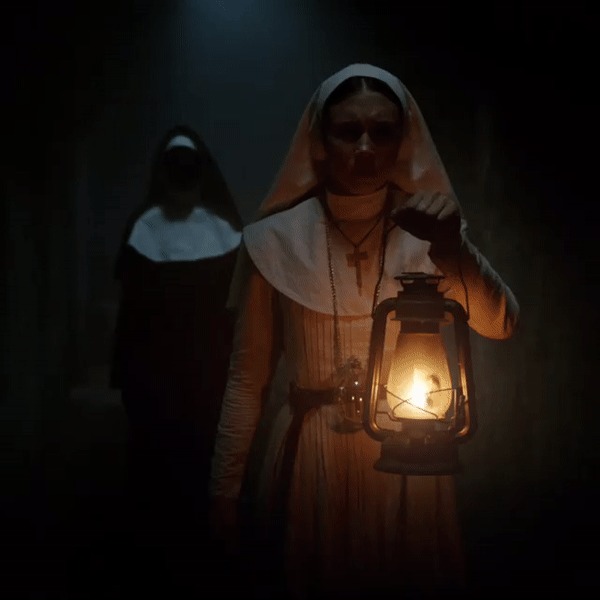
That’s why I’m here to contribute to the #MeToo movement, and take down the patriarchy one trope at a time.
Today’s post is going to take you through a rundown of women in the horror genre, how women have figured in the paranormal theories inspiring these films, and how The Nun is the feminist icon we should all stan this Halloween.
So, grab a crucifix, burn some popcorn in the microwave, and chuck on a white-purple-n-green sash.
Let’s get spooky.
How did horror films portray women before The Nun?
As made evident by recent allegations, convictions, and cases – or just, like, watching a film – you can see that most of the film industry has been stuck in the wrong century.
And it’s not difficult to decipher that horror films have featured prominent tropes that support this.
Their distressed and weak women are the fundamental building blocks to misogyny.
It’s even been traced to specific horror film genres, styles, and characters!

Take slasher films:
From The Texas Chainsaw Massacre to fellow horror icon Carrie, these films have been traced back to the good ol’ American Dream. The middle-class aspirations reflected across society and into the films that furthered the negative – but mainly weak – images of women.
And these images became some of the most striking tropes in horror films.
The first of these tropes is the Final Girl.
She’s pure, and she’s untouched.
She doesn’t smoke, doesn’t drink, and most definitely doesn’t die.
The female virgin is the first character to see that things aren’t quite right, and she’s the only one to see us through the plot and finally kill that monster.
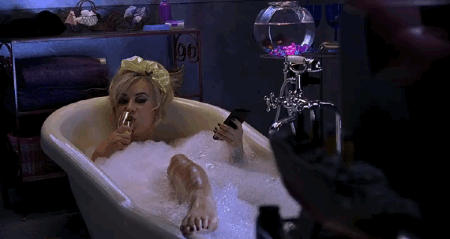
(And yes, that vague plot works for basically every horror film ever…)
The Final Girl gets her name by taking on male characteristics, ditching her femininity and finally taking on the monster!
With her new-found masculinity, she can survive, and live up to her name.
But it’s only when she conquers the monster by turning her back on femininity that she embodies the next trope on our list:
The Female Monster.
One of the main factors reinforcing misogyny is the sexualisation of the female body.
And in case you hadn’t noticed, the oversexualisation of women is central to most horror films.
From awkward sex scenes, to the troubling portrayals of high school girls, women’s bodies have undergone their maximum objectification in the horror industry.
But what I want to talk about here is the female monster.
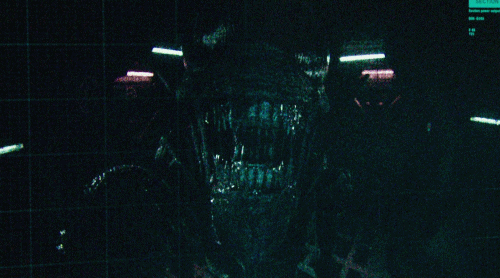
Her body is not used for a picture-perfect DVD-cover shot, and it’s not put in slow-mo for a cringey running shot. Instead, horror films consider the female monster’s body as abject.
By bringing together the physical processes associated with women – which include menstruation and giving birth – the monster is constructed.
Just think of the obsession with the ‘hysterical woman’! The horror film industry has spent most of its years evoking the image of the ‘triggered woman.’
Thus, the female monster is based on physical disgust as well as the masochism she seeks – this is what drives a wedge between male and female villains:
Male monsters commit sadistic acts in the aim of self-mutilation. Female monsters on the other hand commit such acts to avenge the abuse carried by those around them.
Take I Spit On Your Grave or Carrie.
Both iconic horror flicks, both iconic examples of the female monster:
Carrie avenges her high school class and spends most of the plot covered in pigs’ blood, echoing her original menstrual difficulties; and Jennifer is sported on the film posters as wearing little clothing and smeared in a sexy array of mud from which she seeks revenge on her rapists.
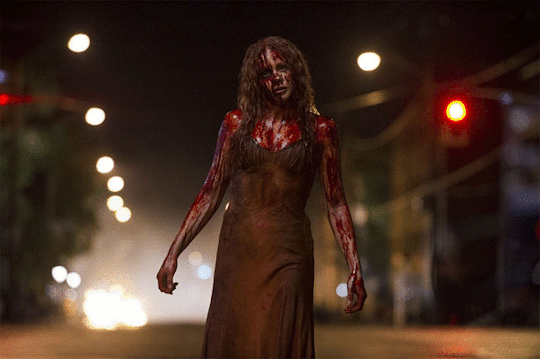
Evidently this fulfils the role of the ‘male gaze’ which never falls short of most genres, unfortunately.
But within this, we have to consider the key role of menstruation.
Think back to the opening scene of Carrie.
No, not the weird soapy boob bit, the bit where she starts bleeding from the vagina.
(Which BTW isnt how periods work in the shower.)
It is actually believed that the female monster can be traced to the bleeding vagina thing.
Basically, when a girl hits puberty, she immediately becomes a monstrous being, and follows another step to becoming the ‘female monster’.
Following on from this obsession with disgusting things and women, we come to the perverted mix of sex and violence that has contaminated the genre.
Take The Chase scene:
Think of the ripped clothes, the dim-yet-sultry lighting, and the dewy skin; it’s a live pop performance away from a Victoria’s Secret Runway!
Female victims are believed to be captured in this confused state of a sexualised body image and violence-infused distressed 5 times longer than their male-colleagues.
And once again we return to the Final Girl, and her survival of The Chase.
The final major trope we need to consider is that of the possessed young girl.
Affirming its role as a major horror theme, the innocent young girl is often laden with creepy vibes as the dangerous and demonic spirits take control of the events of the film through her.

And it’s possibly because an all-powerful demon strikes such a contrast with the innocent young girl.
Consider one of the most famous horror films to grace the industry - The Exorcist.
The all-swearing, sexually-harassing, self-mutilating, all-knowing possessed Reagan challenges every component of being a ‘young girl’.
And this is the mirror image of the role of women within paranormal theories.
What’s the role of women in paranormal theories?
Theories regarding the paranormal obviously are entrenched in past beliefs regarding the societal roles of the sexes.
The supernatural was their science, and their religion their law!
But I’m not here to list all the supernatural theories that specify the differences between the genders.
I’m going to focus on one key piece of theory that echoes out into the horror movie industry:
And it’s how women and young girls in particular were deemed more likely to be possessed by spirits.
To skip out the confusing bits, this is what you have to know: as women and young girls are considered weaker, they are more ‘open’ to allowing in spirits and demons, and thus being possessed.
Obviously, this has made its way into pop culture.
But beyond the creepy possessed girl is the gender roles entrenched within the theory of possession.
If we compare European and African sentiments regarding possessed women, we can see that each specific country upholds a specific focus on women.
For example, several African countries focused upon how possessed women were more likely to leverage their condition in order to gain luxury items.
Some belief systems even classified that certain spirits could possess only women!
Clearly, women’s relationship with the paranormal has been painful to say the least.
And this is what makes The Nun the feminist icon that it is; it breaks down both the horror film-specific misogyny, and the misogyny inherent in paranormal theories.
Here’s how.
Why we should stan The Nun. Like, right now.
Upon The Nun’s release, it was branded a basic-bitch horror film.
It had endless jump-scares, a silly monster, and a forced plot used to duct-tape the films together. But underneath that surface we see a feminist icon disguised as a basic-bitch horror film.
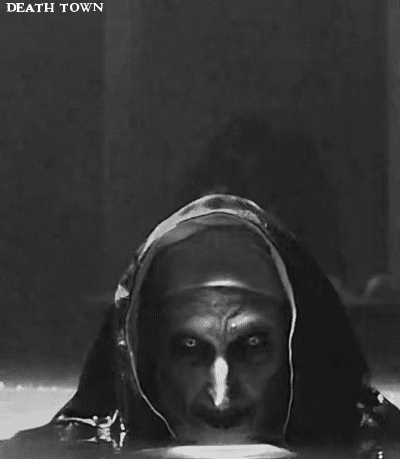
*I am about to discuss key plot points from The Nun - this is your spoiler alert!*
The film starts with the Vatican responding to claims of strange activity in an abbey (that just so happens to house the demonic Nun, Valak). A group of priests and other clergymen dictate the situation, and seemingly control the narrative.
And it’s this masculine and priest-based control that sticks to traditional films.
So, when the dream-team sent to investigate Valak is finalised, the move against the traditional tide surges.
We see the emergence of a new dynamic between the main characters – Frenchie, Sister Irene, and the Priest.
And it’s all down to the young soon-to-be-nun, Irene, who join forces with the priest to seek out the activity, and complete god’s mission on earth. Clearly – as she is a virgin and embodies the purity we expect from the trope – she is the Final Girl.
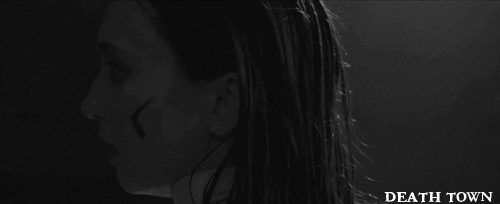
But she doesn’t swan around being cute and dorky. She doesn’t even end the film with a succinct rescue!
She expresses her own agency by placing power in her faith, and in her desire to be a Nun, which is the thing that fulfils her identity as the Final Girl.
Indeed, it is her visions that lead them to victory over the demon, Valak.
Her own faith which celebrates her virginity is what saves them!
She also demonstrates her own agency by going against the church’s teaching on dinosaurs, and when they embark on the journey to the abbey and deal with the problems there, she isn’t just a sidekick.
Irene stands together with the priest, and brings her own set of knowledge to the table. Sure, the priest embodies his own set of wisdom from his previous experience of exorcisms and his position in the church.
But it’s the collaboration between the two - rather than a well-timed rescue - that really emphasises her power.
To complete this, upon meeting Frenchie – who immediately smells of a love interest the second we see the curly mop of hair and hear that accent – he makes a pass at Irene. He is quickly shot down, and from there we see no forced love story set to entice the female audience.
Sister Irene is a new wave of ideas and spirituality that manifest even more promisingly in her visions. She represents feminism - this is key to my next point.
Now, I’m gonna be honest – I get confused here.
A key premise of the film is that Irene has visions. And one of these is when her and a group of nuns are praying to seal Valak in the abbey, and keep the demon at bay.
I’m not sure if all of the nuns we see throughout the film that were at the Abbey were real or just a part of these visions.
But we do know that at least one of these nuns existed - Victoria.
She was the nun that committed suicide at the beginning of the film.
It is later confirmed in the film that Victoria committed suicide to prevent Valak from possessing her body and escaping out of the Abbey. And alongside this, we see the constant battle and bravery of the nuns in keeping Valak at bay!
Just before Victoria commits suicide, another nun takes on the challenge of facing Valak, and attempts to seal the demon using the relic that we later find out is the blood of Christ.
Consistently we see nuns be badass.

We see meek and mild women, drenched in Final Girl tropes throwing off the shackles of patriarchy and reclaiming not just their right to their sexuality and womanhood, but also to defending their faith and what they believe in!
What defines them is no longer their bodies, it’s their beliefs.
This is made dually effective by the comparison between their consistent efforts to keep Valak at bay and the initial efforts of the crusaders. The nuns mirror the efforts of actual knights, and use their agency and power of being nuns to do so.
We then come to the Nun - Valak - herself.
The monster titling the film ties together the tropes of the female monster and the possessed girl, evoking the role of women in horror films for the last 100 years.
Nuns often fulfill a mothering image.
So – just like the innocent young girls that figures so prominently in films such as The Exorcist or The Exorcism of Emily Rose - the mocking of such an image by a demon incites the traditional approach we see in traditional horror films.
This is accentuated by her appearance.
Not far off the female monster, Valak is hag-like, stretching the perverted image of a woman by mocking a nun.
And Valak’s demise – which is brought about by the most badass scene ever – involves Irene spitting the blood of Christ in it’s face.
It is a true act of guts, grossness, and power.
It once again evokes the obsession with blood and the female monster splattered across previous horror films.
It truly brings together the main image I have concluded is core to this film:
The new, badass anti-patriarchy nuns who defy all Final Girl tropes and represent feminism defeat Valak who symbolises the past, misogynistic horror film tropes.
(Okay, fine, I doubt James Wan and the rest of the people working on this film had this message in mind.)
This is solidified by the final 2 scenes that end the flick:
We think that Valak is defeated and sealed away in the hellish crevice from whence it came.
But it is not.
Instead, it has possessed Frenchie, and this is who the Warrens find and exorcise. Footage of this then draws us back to the first film.
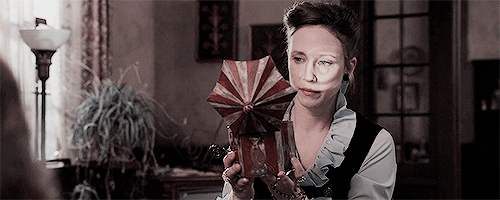
See, what matters here is that a man is possessed.
From the dozens of films I have sat through, I can think of few that actually involve men being possessed.
And that’s why I fucking love this movie:
The film ends by overturning misogyny, and it’s this ground-breaking male possession that kickstarts the whole Conjuring series!
They may not have defeated Valak, but they defeated the misogyny inherent in horror films.
***
This film will go down in the reviews section as a trope-filled-jumpscare-ridden-basic-bible-bitch- film.
But it’ll go down in history as a feminist icon.
(Well, to me, anyway.)
Now it’s time to hear what you think:
Do you think The Nun is the feminist icon we all need?
And are there any other feminist horror films that we gotta know about?
#halloween#halloween costumes#the nun#the nun 2018#the crooked man#true#true story#based on a true story#horror movies#horror film#halloween 2018#halloween 2019#the conjuring#the conjuring 2#ed and lorrain warren#horror movies 2018#horror movies 2019#the nun movie#the nun imbd#feminism#feminist#feminist films#metoo#me too movement#valak#carrie#the exorcist#paranormal#supernatural#haunted
32 notes
·
View notes
Text
The Handmaid's Tale - ‘Household’ Review
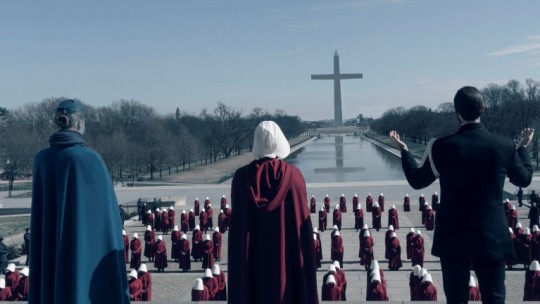
What a lovely day for a trip to Washington. Be sure to pick up your handmaid at baggage claim before you leave National Station.
Visually, this episode was stunning, the always amazing photography even more striking when applied to the perversion that is now D.C. Seeing the Washington Monument transformed into a giant cross made me sick to my stomach. The desecrated Lincoln Memorial was even worse.
The unspoken word throughout this episode was "slavery." Lincoln freed the slaves, but slavery is back, in the form of all of those thousands of handmaids at the reflecting pool praying for the return and enslavement of yet another girl baby. It was an appropriate place for June to confront Serena with her betrayal, and that was a powerful scene. A despairing June walking up to that dead monument and leaning up against it also made me cry.
Serena doesn't have a plan, after all; she simply changed her mind when she saw baby Nichole at the airport. It was clear that Serena was seeing baby Nichole in Gilead like the Winslow children having a tea party in their luxurious nursery surrounded by adoring Marthas, while June sees baby Nichole enslaved and maimed like the permanently silenced handmaid, Ofgeorge. Sick cultures tend to get sicker, and DC is hard core. June was shocked and nauseated when she saw the rings closing Ofgeorge's mouth. The next morning during the photo op at the "wings" statue, Aunt Lydia pulled down the covering and saw the rings too, and I could swear she was shocked.
They're doing something interesting with Aunt Lydia this season, aren't they? When she first noticed the red mouth coverings that the D.C. handmaids were wearing, she said admiringly, "The devotion!" as if the handmaids had chosen to wear them as a tribute to their role and to God. She didn't realize that this new fashion accessory was designed to hide those rings until the photo op. When Aunt Lydia brought the mouth covering to June for the prayer at the Memorial, June asked her tearfully, "Do you want us all to be silenced?" and Lydia said, "No. No, I don't." Lydia seems to believe in Gilead most of the time, but I think the harsh reality is starting to wear on her. I think she's grown to care about June as a person. And maybe she'll do something horrible to June in the next episode. It's hard to tell.

(While I'm talking fashion accessories, how about the veil covering the top half of Serena's face while June was wearing a piece that covered the bottom of her face? Serena and June are two different sides of the same coin. They are both slaves in Gilead, just at different levels.)
At home with the Winslows
The title of this episode is "Household." The household in Gilead is a sick construct, an imitation of actual family life. Fred Waterford's household doesn't really include June any more, except when he "borrows" her from Joseph Lawrence. And the Winslow household features six stolen children, which was jarring.
High Commander Winslow (Christopher Meloni) is clearly hot for some commander-on-commander action. Poking his rear end in Fred's face could have simply been a pool-playing accident, but the shoulder caress made his intentions clear. Part of me finds the idea of Fred as a powerful man's sex toy karmic. How much does Fred want power? Enough to become a "gender traitor?" Hard to tell what Fred was thinking. He carefully placed the cues back on the pool table, but his face was in shadow.
And so much for Nick
The Canadians have asked a neutral party, the Swiss, to intervene in the Nichole custody battle because Gilead is a black box to the rest of the world, what happens in it is unknown, the Gilead government is a mystery. Unfortunately, the Swiss and the Canadians are afraid of Gilead's power. That's not good.
I thought Nick was going to be the answer to, well, something. But no. When Nick "stood in" for Fred in the camera shot, he joked quietly with June, "Nice girl like you in a place like this" and surreptitiously touched her hand, that felt like the old Nick, the one that contacted Luke. When he dropped by the Winslow house to say an illicit goodbye to June, she begged him to save their daughter, to see the Swiss mediators. But Nick appears to be a master of compartmentalization. June has made assumptions about Nick that were wrong – he was, and he is, a soldier of Gilead. The way he strode through the train compartment of soldiers like a Nazi commandant was a shock.
As we've been told more than once, men won't be coming to the rescue. The women will have to rescue themselves.
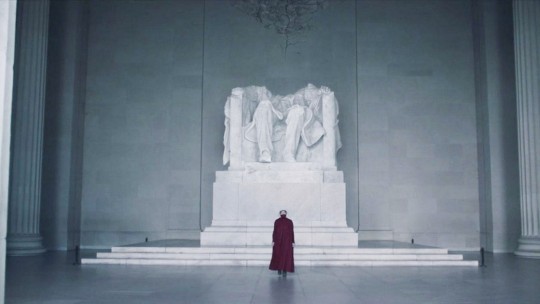
Bits:
— Of course, this episode was filmed in Washington, D.C.
— The "handmaid claim" was a red circle of carpet surrounded by escalators going in three directions. Again, stunning photography. And did you notice that the parallel escalators were gender specific?
— Olivia Winslow (Elizabeth Reaser) loved Serena's book, and told Serena that it "saved" her from a life in corporate law. Is a High Commander's wife open to the Resistance? Probably not.
— When June was interviewed by the Swiss mediators, they gave her a glass half-full of water. No irony there.
— Luke gave June's cassette tape message of love and confession about Nick and Nichole to the Canadian government. That felt like a betrayal. It gave me a turn.
— There were caged birds in the Winslow house, because there is never too much symbolism.
— Serena isn't wearing her wedding ring and she's not sharing a room with Fred.
— This week's interesting music cue: "Every Day" by Buddy Holly as June was leaving the Swiss.
— I'm going to mention the current administration's march toward more misogyny and isolationism, and move on.
Quotes:
June: "I pray for Serena. May she find her way back. May she see past her broken heart and remember that Nichole is better off where she is. May she convince Fred to let things lie. Or may they both get hit by a fucking truck. I'm honestly down for either."
Aunt Lydia: "They don't stand for disorder. Not in the Capital."
Fred: "And we're off! Like a herd of dusty turtles."
How jovial. This is all normal, guys.
Winslow: "We have to be judicious about the images we release to the world."
You know, I'm starting to think some real publicity about what's going on in Gilead might make a genuine difference.
Serena: "I should have put a ring in your mouth the day that we met."
June: "I should have let you burn when I had the chance."
Four out of four… mouth rings would probably be too pat. Artificial tea parties, perhaps?
---
Billie Doux loves good television and spends way too much time writing about it.
#The Handmaid's Tale#June Osborne#Serena Joy Waterford#Fred Waterford#Aunt Lydia#The Handmaid's Tale Reviews#Doux Reviews#TV Reviews
5 notes
·
View notes
Text
“I do see exclusion as an inherently bad thing, yes, and nothing will change my mind on that. Simply because women are not a monolith, and being born with a vagina does not mean we all share the same experiences of how being female relates to the world.
I believe in intersectional feminism, and that transwomen are very much a part of that.”
And this is the core thing, isn’t it. I actually held this same opinion until a couple of years ago. I started seeing a certain kind of rhetoric from trans activists online - some of whom, upon reflection, probably represent an extreme view that shouldn’t be taken too seriously - that had me doing double takes and started changing my mind. I’ll back up and try to explain how my mind changed and why I struggle with this topic.
I agree with you that women are not a monolith and that women in general have different experiences. I also agree that being born with a vagina does not mean we all share the same experiences of how being female relates to the world, but I disagree with what that implies and how you’ve interpreted that - those different experiences are because of the different cultural takes on what that vagina means. The presence of the vagina is inherent and necessary.
The fundamental principle of feminism that I grew up with is that the category of woman is given to people with the female reproductive system, and that category was seen and treated as inferior for no good reason in all cultures. What ‘woman’ actually is (gender roles, gender expectations, treatment by wider society etc ie “gender”) is culturally malleable and constructed and varies slightly from place to place; the universal consistency is that this category is placed upon people born with the female sex (distinct from gender) in order to control and oppress them. Like, it’s key to feminism that the sex provokes the ‘woman’ category, and females are socialised into the ‘woman’ role. The oppression women face isn’t due to a demonstrable lack of intelligence or capability or physiology, it’s because someone looked at our genitals as babies and went 'okay, this is what we call and how we treat people with this biology.’
So that’s my understanding. Women are historically oppressed due to abitrary negative stereotypes placed on them because of their biological sex. How that oppression manifests is different according to culture, geography, ethnicity, religion. Where intersectionality comes into it, for me, is acknowledging all those differences in experiences and including them in feminist progress in dismantling these stereotypes and the unequal treatment and discrimination resulting from them.
(some) Trans women state that they are women because they essentially 'feel like it’. They claim an internal sense of 'womanhood’ and this means they are women. When I saw this I was like “:/ okaaay, but how do you measure that, what does that actually mean.” This internal sense seems to be explained in terms like “I preferred pink and playing with dolls as a child, and I always got along better with girls, I preferred doing girly things.” This is more of a call on gender stereotypes than a satisfactory explanation - identification with the performance of the arbitrary, cultural construction of gender, something which changes over time and with which many (cis) women do not identify (yet are still discriminated against - their feelings don’t matter to people who look at them and treat them differently). They have this idea of womanhood and identify with that. I know trans people say that cis people don’t understand that internal sense of 'manhood’ and 'womanhood’ because in them it’s all aligned with their sex - I disagree. If there’s this strong of an internal sense of being a woman or being a man, surely a reasonable proportion of all women and men would report experiencing it. Again, I’m falling prone to the anecdote thing, but in my case, I don’t 'feel’ like a woman. I’m a person in a meatsack who is treated unfairly because of stupid ideas about the meatsack that have nothing to do with my qualities as a person. My female and male friends report the same kind of feeling. If I woke up tomorrow in a male body, I’d probably miss some things about my female body, but I’d be able to go through life in a male body without too much concern. I would then be a man and not a woman, despite my previous few decades in a female body; the concept is a nothing concept so it doesn’t matter. I am open to the idea that people have an innate sense of womanhood or manhood, but it’s so subjective it’s not very useful as a key identification measure for a political group. This is a very different definition of 'woman’ and to me, it completely undermines the key principle underlying feminist discourse.
What is also confusing to me is that the transgender community seems roughly split into two groups - those, like above, who *feel* aligned with the opposite sex; and those who say there is a physical miswiring somewhere that causes a mismatch between their internal sense of themselves and their sex, this is a medical condition called gender dysphoria, and the best treatment is transition. Ie you’re trans if you think you are, you’re a woman if you think you are, and you’re a man if you think you are, versus you are trans if you have gender dysphoria, you think you are a woman but biologically you’re a man and you can’t expect to be treated as a woman (or a man) until you physically transition, which will ease your dysphoria. These are two quite different experiences underpinning the definition of transgender. To me, all this confusion over what it even means to be transgender doesn’t represent a cohesive front or group to meaningfully discuss this stuff with.
The big thing that got me criticising the issue of inclusion of trans woman is the above realisation, that that definition undermines the ideological foundation of feminism that has brought so much progress to women. It’s an ideological difference that’s fundamental. Other things that bolstered it was accompanying rhetoric I saw online.
- eg it’s transphobic/exclusive to discuss things like uteruses (uteri?), menstruation, FGM in feminist spaces, if you do it, you’re a bigot. That doesn’t feel like progress to me, to tell women they can’t discuss the bodily stuff that is the basis of their oppression, and still is for girls and women around the world, in the context of their experiences as women and as people in the world. It feels like misogyny by another name.
- eg it’s transphobic to have genital preferences. I think this is a horrible thing to say. Some people do not care what genitals are involved in the sex they’re having, that is fine. Some people do, and that is also fine. Dating and who you have sex with is inherently exclusionary - not everyone is attracted to every person in their identified pool - and it involves bodies, it involves hardwired preferences, and these things can’t be changed if you just think about it really really hard. 'Preferences’ is not a good word for the concept, it implies a choice that I don’t think is there. I really don’t think people choose what they’re attracted to and what turns them on in sex. Examining your sexual self to understand how you operate and what you like and don’t like is an excellent thing to do. I also agree that trans people find it hard to date people. But calling people transphobic - especially lesbians, this seems to happen more with lesbians and trans women than gay men and trans men - because of something innate is just shitty behaviour. I was really disgusted by this. No one is owed sex.
- eg there are no real differences between trans women and cis women. Any differences noted in discourse are a result of the person stating them being transphobic. A person who says they’re a woman has female biology because of this statement. This is an attitude I see a lot - any criticism of things like the above, any reference to any differences between trans woman and cis women, and suddenly you’re a bigot, a terf, a transphobic asshole, wrongthink in action! This worries me. Because there ARE differences, and shouting them down is not the way to bring people to your way of thinking.
- eg gender dysphoric children should be encouraged to transition or go on puberty blockers. There’s a study out there that states something like 70-90% of gender dysphoric children desist by the end of puberty. Telling them they’re trans and putting them on drugs is not the right way to treat these kids, sensitive and appropriate counselling is. This in particular really worries me.
- eg detransitioners exist and have a lot to say, but because it’s critical of transgenderism, they’re ignored. This rubs me the wrong way - they have insight into the interplay between self-understanding, sex, gender and culture, that’s valuable to general understanding of the self, sex, gender, and culture.
I could go on, but this is so long. So I was originally supportive - I really was. I’m now more critical, because I don’t see a clear cohesive movement that is, ironically, inclusive, or that supports feminist issues, I’m seeing something that aggressively undermines the one movement that has truly progressed women’s rights. It strikes me that women and feminists are arguing about this more than men are, that men aren’t saying 'trans men are men’ in the same way women are expected to say 'trans women are women’. That also says something to me about the overall issue, and it’s not a good thing.
It’s entirely possible that I’m hanging out in the trans part of the internet that has the assholes in it. Every group has its assholes. I also acknowledge that radical feminist groups have their hateful assholes too - but the reason I went into radical feminist spaces was to see what those evil terfs are saying and why they’re so bad, and I didn’t find evil, I found them addressing the concerns I had. They’re talking about the above things, whereas in the supposedly inclusive spaces with trans people, those topics weren’t allowed to be discussed. But I haven’t seen many answers to some of the problems trans people face - violence and discrimination in employment and housing is a real thing, and that does need to be addressed. By feminists? I’m not sure. Trans people are more than capable of organising in their self-interests - if they could find a common ground and common interests. I do think trans women face violence in male spaces and can be accommodated in female spaces - within reason. The case of Karen White in the UK is a good example of how that’s not a good rule of thumb. There’s also a domestic violence shelter in Canada that’s being sued by the women who were in it for allowing a trans woman inside, because the trans women acted in a very predatory way that caused the women distress in a place where they expected safety. I also know of one trans woman in Vancouver who tried to have a rape crisis shelter defunded because it didn’t support sex workers - that’s a valid criticism, but defunding it isn’t the action I would hope to see from any woman; it’s pointedly aggressive coming from a trans woman.
For me, I do wonder whether people such as yourself are seeing the same stuff I’m seeing. I guess not. I find it very difficult to go back to the whole 'oh yeah, trans women are women and share our oppression’ stance, because I just don’t see that in evidence. In our conversation I notice that we’ve got a really fundamental difference in how we interpret and approach the world, for example the exclusion thing. Perhaps it’s too fundamental a difference and we won’t find much to agree on. I don’t know if you’ll take the time to respond to this, because it’s so long, but if you could articulate why this inclusion makes sense to you, I would actually really appreciate it. If not, that’s fine, we’re both busy people. Thanks for reading anyway, and thanks again for the conversation and for engaging with me. I *am* sorry about the length :S
DW:
For me, it’s not a matter of “transwomen are women and share our oppression.”
It’s a matter of “transwomen are women and are oppressed because they are transwomen.”
Their oppression might not be exactly the same as mine, but neither is the oppression of a 12 year old child bride on the other side of the world.
Simply put, it intersectional feminism can make room for all the different types of experiences of women–cultural, and economic, and religious, and social, and geographical–then why not widen the umbrella to include transwomen?
There’s also a domestic violence shelter in Canada that’s being sued by the women who were in it for allowing a trans woman inside, because the trans women acted in a very predatory way that caused the women distress in a place where they expected safety. I also know of one trans woman in Vancouver who tried to have a rape crisis shelter defunded because it didn’t support sex workers - that’s a valid criticism, but defunding it isn’t the action I would hope to see from any woman; it’s pointedly aggressive coming from a trans woman.
There will always be anecdotes, and there will always be assholes, but judging all transwomen by the actions of a few is not helpful to anyone.
When it comes to women’s shelters, there are plenty of shelters who don’t allow boys to stay, forcing families out onto the streets in cases of domestic violence because a mother doesn’t want to be separated from her son–who is a child. I think that’s unfair and wrong, but I’m not going to claim from that that all feminists are anti-child.
I’ve taken calls from women’s shelters before where women were being threatened by other women and the workers were requesting the police. The women there also had an expectation of safety, but gender doesn’t come into it, and the implication that the transwoman was predatory because she is trans is drawing a very long bow.
In the case of the Vancouver rape crisis shelter, why aren’t sex workers supported? That seems discriminatory. Also, why it is more “pointedly aggressive” coming from a transwoman than from anyone else? Given that transwomen are over-represented in sex work, why wouldn’t a transwoman have every right to want to fight this?
And you can bring up Karen White if you like. And I can counter with articles about transwomen who have been raped in male prisons, which I hope you would agree is just as heinous.
In the end, nothing is going to change my mind on this. I think that being a woman is more complicated than a biological function, and I think that transwomen, while not oppressed in the same way as ciswoman, still face oppression because of their gender. And I think that there is plenty of room to be inclusive.
15 notes
·
View notes
Text
When Bindels speak*
Fourteen years ago, in an opinion column in The Guardian provocatively entitled ‘Gender Benders, Beware’, lesbian feminist activist Julie Bindel wrote that:
“I don’t have a problem with men disposing of their genitals, but it does not make them women, in the same way that shoving a bit of vacuum hose down your 501s does not make you a man.”
I vaguely remember reading this at the time, slightly bemused both at the piece and then at the subsequent outraged public reaction to it. Fast forward to a few months ago, and I’ve just published some blog pieces which, though not reaching Bindelesque proportions, have proved moderately controversial in my discipline, academic philosophy. As I discuss and defend my views on social media, and watch others discuss them, the name of Julie Bindel comes up repeatedly, as an example of company which, it is presumed, I absolutely don’t want to keep. A well-established male philosopher intones repeatedly about Bindel’s ‘offensive, transphobic’ comments in the past. Another describes her to me as a ‘loopy extremist’, and ‘potty’. I go back to find the article online and rather disbelievingly check whether it’s the same one I vaguely remember. It is.
Now, to attempt to mitigate against such perceptions, which perhaps you share, I could tell you about Bindel’s frankly stunning track record of effective activism, working on behalf of natal women and girls world-wide with an energy and bravery which borders on heroic. I could tell you that the context of her Guardian piece was partly a discussion of an attempt by trans women Kimberley Nixon to sue Vancouver Rape Relief for not allowing her to work with traumatised natal women fleeing male sexual violence: a case which rumbled on for another three years before Nixon lost, costing the shelter thousands of dollars to defend against. I could point out that the idiom of the piece was clearly intended to be comic, colourful, and frank, and was pretty funny in several places; for instance:
“When I were a lass, new to feminism and lesbianism, I was among the brigade who would sit in the women’s disco wearing vegetarian shoes and staring in disbelief at the butch/femme couples, mainly because they were having a better time than me”.
I could tell you that even so, she later apologised ‘unreservedly’ for writing the article. I could point out that many of the things she says in the piece are prescient, and over time have only got more troubling: worries about how trans ideology often essentialises wholly sexist gender stereotypes about masculine and feminine behaviour; about the development of a culture apparently in favour of cutting off parts of healthy bodies if one is ‘unhappy with the constraints of .. gender’; and about the harmful implied message sent by this culture to butch lesbians and camp gay men. And I could also easily manifest the anger I felt, as I read these online comments from middle-class heterosexual males, typing smugly and contemptuously about one moment fourteen years ago in the life of a working-class lesbian, who has devoted most of the rest of that life to addressing issues such as child grooming, sex trafficking, prostitution, and cross-border surrogacy; doing activism in the field, and not just from the armchair.
But to cite these facts as exculpatory of Bindel would suggest that an ordinary woman who had said roughly the same thing as her– that is, that trans women aren’t, in fact, women — and yet who was not already a heroic feminist defender of natal women, or who wasn’t partly talking about an odiously selfish individual such as Nixon, would be at fault. I deny this too. That is, I reject the near-pathological zeal with which trans activists, ‘trans allies’, and ‘woke blokes’ generally, seek to monitor and control natal women’s language in this domain: not just with respect to discussing whether trans women are actually women, but also in uses of particular names and pronouns, and gender attributions.
The statement “transwomen are women” has become a kind of mantra for so-called progressives. To understand what it is meant by it, we need to distinguish the use of that phrase, in those mouths, from two other contexts. One of those involves a claim about the law. Since 2004, those in the UK with a Gender Recognition Certificate are counted as having had their gender ‘reassigned’. This is not, and was never intended to be, any pronouncement on a biological fact. It is in fact impossible for a child or adult to biologically change sex. (I’m prepared to offer arguments for this, if needed, but most readers will, I hope, accept it as true). Nor was this law supposed to pronounce definitively on the question of whether a trans woman with a GRC ‘really is’ a woman. The Gender Recognition Act was at most intended to allow for a legal status — that of ‘gender reassignment’ — for the purposes of access to certain protections under the law.
A second version of the claim “trans women are women” is uttered for therapeutic reasons. One basis for self-identifying as a trans person is the condition of gender dysphoria. It is assumed by many medical practitioners that, on diagnosis of this condition, treating a person ‘as if’ belonging to their self-identified gender is helpful to their well-being; whereas confronting them with their ‘birth-assigned’ gender, or the biological facts of their sex, is not. We might easily interpret this as a kind of benevolent role-playing or method-acting, extending from the medical practitioner out into the wider community: act as if a trans woman is a woman, in most social contexts. But this is completely compatible with denying that trans women really arewomen, in a more committed sense.
Somehow, though, in recent years, a respectful concern for the well-being of trans people has supposedly morphed into a literal claim about category membership: trans women really are women. That is: trans women belong unambiguously in the category of women; the concept of woman literally applies to them. For most trans activists, this is supposed to be true whether the trans woman is a post-operative transsexual, or a trans woman on hormones, or whether she belongs to the significant proportion of trans women who are neither. She ‘is’ a women, whether she transitioned in her teens, or in middle-age; whether thirty years ago, or yesterday. Moreover, for many trans activists, not only are trans women literally women, but if they have children, they can be mothers. If they have female partners, they can be lesbians. They can be victims of misogyny. And so on. One by one, the familiar words women have used to describe themselves tumble like a chain of dominoes.
Such claims are usually unargued-for. They are presented more as self-evident truths; the outcome of revelation, perhaps, or as some article of faith which it would be downright evil to try to deny or complicate. As this description suggests, agreement with such claims is ruthlessly socially enforced by trans activists. Not only are you not supposed to refer to or imply, in front of a trans person, any fact about their natally-bestowed gender or biological sex; you aren’t suppose to mention these, even in their absence. To do otherwise is sometimes called a form of ‘violence’. Even on a massive UK discussion forum like Mumsnet, in a thread about trans people written by gender-critical feminists and directed towards fellow gender-critical feminists, you aren’t supposed to mention it. Even on a Whatsapp group chat involving natal women working at the BBC, you aren’t supposed to mention it. It doesn’t matter if your subject matter is Labour party all-woman shortlists, what to do about children who think they are trans, medical discussions, biology teaching, or presumably, your own relatives; you are never, ever, eversupposed to describe trans women as men or male, ‘deadname’, ‘misgender’, or use the ‘wrong’ pronouns out loud. Even trans women themselves aren’t supposed to do these things: see the bullying treatment that trans women in the UK such as Miranda Yardley, Kristina Harrison, and Debbie Hayton get, when they deny that they themselves are ‘really’ women, and seek a different narrative.
This is in itself quite striking, as for other false claims about category membership, people are normally socially permitted to assert them. Take the claims: “Elton John is straight”. “Marvin Gaye is white”. Those claims are obviously false, but there was, presumably, no inward gasp of horror as you just read them. Now contrast with: “Caitlyn Jenner is a man”; “Lily Madigan is biologically male; he is a man”. Even though I mention these as exemplary sentences, rather than assert them myself, I assume that at least some readers think I just wrote something awful. Moreover, this is presumably not just the feeling that I showed a lack of respect for the addressee’s wishes; for if I tell you that the composer of the song ‘Rocket Man’ is Reginald Dwight, presumably you don’t think I just committed ‘violence’ against Elton John by ‘deadnaming’ him.
Writing down those phrases about Jenner and Madigan just now, but without quotation marks, would be enough to have me banned from Twitter. Articles have been removed from Medium for less. This is not, despite what opponents have sometimes suggested, because such statements are obviously morally equivalent to denying the personhood or humanity of those who are racially different to oneself. (Again, I’m happy to offer arguments for this — it won’t take long — but I leave it aside for the moment, on the assumption that most readers aren’t so sophomoric). Nor is it reasonable to think that hearing such statements will generally cause trans people to have thoughts of suicide, as is sometimes dramatically suggested by Owen Jones, in a way that means we should never utter them.
A better explanation seems to involve the thought that, should a speaker X publically refer to a trans person Y by their natally-bestowed name or pronouns, even out of the earshot of Y, Y might later find out about it; or at least, some other trans person might find out about it, and by extrapolation to their own case, be caused to experience a distressing episode of dysphoria. Equally, presumably, it is worried that if a trans woman overhears a general claim such as “trans women are men/ males”, she will be caused great distress; perhaps too, a trans man might be caused great distress, again by extrapolating to his own case.
However, this reasoning clearly has limits. If gender critical feminists are talking to each other on a discussion thread clearly advertised for the purpose, or in a Whatsapp group, then it just seems too demanding to require they talk a certain way, just in case a trans woman or trans man reads or ‘hears’ them. The trans woman in question would almost certainly have to be specially looking. Quite often trans activists will equate misgendering along the lines of going up to a trans person and screaming ‘you’re a man!’ in their face(always ‘screaming’, of course). Obviously this isn’t what is happening in the contexts just mentioned: this is natal women talking to other natal women, about matters of great importance to them, as such, and with no reasonable expectation that they will be accidentally ‘overheard’.
In any case: even if one can foresee that trans people will overhear when one denies that trans women are women — is that a compelling reason not to say what one thinks? It rather depends on what is at stake. It was part of the original argument of my blog pieces that rather a lot is currently at stake in the UK with respect to this matter. There are several conflicts of interest that arise between trans women, as a category, and women, as a category, competing for the same spaces and resources. Trans activists seem to think that natal women should accede to all their demands. In that context, I think natal women should be allowed to speak freely in a critical way about the underpinnings of trans activist views. If natal women conclude after consideration that trans women aren’t women, they should be able to say so, whether or not they’re ultimately right.
Partly too, though, I think that the moral horror which unconsciously accompanies ‘misgendering’ in particular is, perversely, an artefact of sexist normative stereotypes for natal women and men. We tend to frame statements like “Caitlyn Jenner is a man/ male” in terms of insults launched at ‘butch’ or ‘manly’ natal women. The combination of a woman’s name and the epithet ‘man’ or ‘male’ sounds insulting, automatically. Compare: “Kathleen Stock is a man”. Were you to hear someone else saying this, perhaps you would empathically imagine me hearing the same thing and finding it distressing or embarrassing; you might assume that as a woman, I must aspire to the norm of a feminised appearance, and must suffer if I miss the mark. But — of course — to say e.g. that “Caitlyn Jenner is a man” isn’t an insult, in many contexts in which it is uttered. It is, in the mouths of many, a descriptive fact, not a slur or insult. Indeed, arguably it could only be an insult in the way just indicated, if in fact the speaker already assumed that Caitlyn Jenner was a woman. And this is, precisely, not assumed by those that tend to say it.
What else might underly the reaction to Bindel, in particular? I’m sure that part of it is to do with another sexist assumption: that women cannot be bawdy, frank, or colourful in their language; they must be sober, measured, cautious, responsible, kind. At this point we might as well also revisit Germaine Greer’s statement from the Victoria Derbyshire show in 2015:
“Just because you lop off your penis and then wear a dress doesn’t make you a fucking woman .. I’ve asked my doctor to give me long ears and liver spots and I’m going to wear a brown coat but that won’t turn me into a fucking cocker spaniel.”
This is a vividly Rabelaisian way of making the basic claim — which I have argued that natal women should be freely permitted to make, whether or not it is true — that trans women aren’t women. It caused an enormous fuss at the time, and is still regularly cited, along with other such statements, as evidence of Greer’s ‘transphobia’. Yet in her brilliant and funny seminal work of feminism The Female Eunuch, published in 1970, it is clear from Greer’s discussion of April Ashley that she held the same position then as she does now. Greer expresses herself frankly about many things, and always has. See also, for instance, this brutal passage, also from The Female Eunuch, about female students in Universities:
“Their energy is all expended on conforming with disciplinary and other requirements, not in gratifying their own curiosity about the subject that they are studying, and so most of it is misdirected into meaningless assiduity. This phenomenon is still very common among female students, who are forming a large proportion of the arts intake at universities, and dominating the teaching profession as a result. The process is clearly one of diminishing returns: the servile induce servility to teach the servile, in a realm where the unknown ought to be continually assailed with all the human faculties: education cannot be, and has never been a matter of obedience”. (p.75)
Now, you very possibly disagree with this, and so do I. And the style may not be to your taste. You might prefer your lady writers hedged, scholarly, sympathetic, and so on. Myself, I find it refreshing, like a bucket of cold salt water has been chucked over me after days of humid air. That is of course, compatible with saying that I disagree with a lot of what Greer says: as I have a mind of my own, this is hardly surprising. But whether Greer is to your taste or not, it is simply obvious that we don’t police colourful derogatory male speech in anything like the same way, whether the males in question are talking about natal women/ females, or even trans people.
The constant harping of progressive men on supposedly salutary examples like Bindel and Greer sends a message to natal women. Don’t say what you think. Don’t express an opinion on what women are; leave it to trans women to decide that. Don’t be assured. Don’t be bold. Don’t be whimsical or linguistically playful. Don’t try to be funny. Watch your mouth. Given the typical circumstances of female socialisation, natal women are already highly susceptible to such messages, and to feeling shame as a result. So here’s a task for any progressive males reading. Next time a natal woman expresses herself in a way you find unattractive, unseemly, unkind, or downright rude about trans people, then, assuming they aren’t “screaming it in a trans person’s face”: why not shut the fuck up and keep it to yourself.
Kathleen Stock
#kathleen stock#julie bindel#transgender#gender identity#female erasure#gender critical#radical feminism#misogyny#trans misogyny#regressive left#male privilege#womanhood#lesbophobia#lesbians#some people are female get over it#trans women#female only spaces#osobni#sexism#feminism#biological sex#lesbian#👏🏻👏🏻👏🏻#text
12 notes
·
View notes
Note
hello yaejin. i wanted to apologize for last night. i'm sorry i brought your mental health into an argument, and i'm sorry i invalidated your feelings. that was out of line, and i honestly fucked up. i saw a pattern ive seen before and i jumped to conclusions and it was inappropriate and cruel, especially while we were having an argument. i was dealing with a mental health crisis of a friend and i let it influence me and i wasn't good enough to walk away and say i couldn't talk rationally.
(sorry, limit). my own situation doesn’t make it okay what i said, and i don’t want to imply it, i just wanted to let you know the context. i’m sorry again.
apologizing for what exactly. sorry for what exactly. you “brought up my mental health” as if it was just a little no-big-deal comment when you used my vulnerability in talking abt my recent mental health struggles as proof that i’m going insane & thus everything i say is illogical when i was talking abt racism in white ace/aro discourse. the ableism was literally a vehicle for you to derail a conversation about race so by copping to just the one, you’re not actually acknowledging the underlying issue framing it. this is such a vapid, spineless, fake apology that doesn’t acknowledge the underlying intent or impact of what that ableism did which was to derail my points abt RACISM & my experience as a lesbian woc who’s also ace. you’re just copping to the obvious thing that even some of the ppl in your clique might feel vaguely bad abt & ignoring everything else.
& you say you just “invalidated my feelings?” LET’S GO IN-DEPTH. first, you were openly hostile for even daring to question you. you brought up corrective rape as a gotcha bc you knew that was an explosive thing to drop & you could derail any objections i have to your ranting as invalidating survivors. & when i asked for proof for your claims of ace/aro oppression & them facing corrective rape, you said you didn’t want to look at triggering material when YOU were the one who dropped corrective rape in the first place w absolute no warning & w no thought if it would trigger ME (which it fucking did btw, thx.) it was curious to me that you used corrective rape as a gotcha for ace/aro oppression when it was created to describe the violence that black lesbians face in south africa. esp in light of how you seem to have this pattern of insinuating how lesbians are somehow so accepted by the lgbt community when we’re so uniquely bigoted & we never try to keep out terfs but don’t seem to take into account how ace/aros can can also be transphobic/terfs as well as homophobic & lesbophobic. that’s not a matter of a few “shitty” ppl. lgb ppl are also allowed to be wary of any non-same sex attracted person being homophobic as they necessarily benefit for not being same sex-attracted esp when have been oppressed for displaying any kind of sexual desire & deemed better if we are asexual. & it seems like you have a pattern of only calling out lesbians instead of like also gay/bi men which i find curious. maybe you do tho & i just haven’t seen. but lesbophobia in the lgbt community esp against lesbians of color is real so it’s just odd that for you to keep saying that we have a completely comfortable position in it. also you positing lesbianism & ace/aro identity as exclusive categories does play into the stereotype that lesbians are hypersexual which is esp damaging to lesbians of color.
anyway, when i researched on my own & found no convincing evidence to support your claims, you threw a tantrum bc NO MY PERSONAL EXPERIENCES & FEELINGS OF BEING OPPRESSED = ULTIMATE TRUTH OF ACE/ARO OPPRESSION. your experiences are valid & all. you’re allowed to feel upset by them. but i fail to see being ace/aro constitutes institutional oppression. in my search, i mainly saw claims of individual microaggressions and acts of verbal violence as evidence of oppression when those things by themselves don’t prove that there’s an explictly anti-ace/aro system of oppression. i can experience microaggressions for being asian & also not being into sex but those are entirely on different levels for me. i know instinctively that racism is an institutional oppression. i’m literally ace & microaggressions for that mean nothing to me in comparison. you feel differently abt it & you’re allowed but again, personal experience of microaggressions doesn’t prove institutional oppression. i also saw vague citings of a study of ppl apparently being more likely to say they’d discriminate against asexuals than lgbt ppl. the study seemed too flawed to me & doesn’t seem to take into account how ppl might know it’s bad to admit they’d discriminate against lgbt ppl but that doesn’t prove they’re not actually homophobic/transphobic. like liberal white ppl likely won’t admit that they’re racist bc they know that looks bad. doesn’t mean they’re not racist. as for corrective rape, i don’t remember finding anything that wasn’t abt violence against black lesbians & certainly not any that cites specifically anti-ace/aro motivations. i’m not saying it can never happen. but in comparison, it can be proven that cr is part of an explicit system of homophobia & misogyny against black lesbians in south africa but i didn’t see any for ace/aros. & i mean, i researched this while reading abt cr which is deeply upsetting to me as a lesbian so it’s not like this was easy for me. but i don’t rly think you have a leg to stand on in this instance bc you never provided any proof & didn’t say what your exacting reasoning on this is. it didn’t even have to be abt cr & i’m not saying you should disclose traumatic experiences, but just… say something to help me understand where you’re coming from. otherwise you look like you’re just expecting a woc to blindly accept & follow you.
& i have to bring up white ace/aro discourse elides how misogyny & patriarchy & racism & other -isms impact pressures to be sexual or asexual. poc esp black ppl are stereotyped as either hypersexual or asexual. being seen as hypersexual is dehumanizing & can be traumatic & lead to real life serious consequences. i’m literally asexual but i empathize w non-asexual poc esp woc & the struggles they face & thus have no interest in white ace/aro rhetoric that posits being sexual as a universally normal, ideal, uncomplicated privilege & asexuals are oppressed by them. also being seen as asexual/actually being asexual can be so damaging & traumatic to poc which is why so many of us are alienated by white ace/aros who posit it as a universally positive thing to be proud of. white ace/aros also imply that they can somehow face oppression by like non-sexual poc which is concerning in light of the history of racist/colonialist ideas of backwards, hypersexual black & brown menaces & seductresses versus the purity & chastity of whiteness. controlling the sexuality of poc is a key part of white supremacy so there isn’t an obvious oppressor/oppressed dynamic here like men/women, white/poc. & considering how reproductive justice is constantly under fire & how there’s societal pressure for women to be effectively asexual until (hetero) marriage, it’s hard for me to think how non-asexual women not in hetero relationships actually… benefit from being non-asexual. there’s also different expectations abt being sexual for men, esp white men, than women & white ace/aro discourse tends to ignore that. sure, men are generally encouraged to be sexual & the shaming of asexual men likely sucks. but shaming doesn’t necessarily mean ace/aro oppression & seems more like to me a symptom of patriarchy/gender roles & heteronormativity. so in my estimation, misogyny & patriarchy & racism as well as other systems of oppression like ableism, homophobia, transphobia, & classism better explain these differing expectations for being sexual or asexual rather than ace/aro vs non-ace/aros being an entirely separate dynamic. i literally couldn’t find any evidence for your claims & you got so upset at me for that but never tried giving me one piece of proof. yes, i know that oppressors demanding the oppressed to prove their oppression to them is a legitimate thing & the oppressed don’t need to feel obligated to educate them. i’ve experienced this frustration many times myself. but your behavior in this instance strikes me as white entitlement & again, a sign of you being frustrated that a woc isn’t blindly accepting you’re automatically right.
& when i started getting rly into the racism in white ace/aro discourse, you rly lost your shit. you dropped your abuse history & claimed i was invalidating you being abused for being ace when i literally never did. you straight up lied abt that. & also i know you know that i have experienced abuse & if you like bothered to think, you would take into account that i could be triggered by you dropping that out of nowhere, but instead you dropped it in an attempt to derail & get me to shut up. now this is when you suddenly rave abt how it’s obvious i’m on a bad mental health spiral & i’m believing in conspiracy theories & i’m paranoid, all a transparent attempt to make everything i said abt racism apparently wrong. w/o giving me a chance to reply, you promptly blocked like a coward. oh, also truly hilarious how you’re such a hypocrite for bringing up your friend’s mental health crisis as an excuse for your racialized misogyny when you literally used my mental illnesses to derail & attack me & dropped 2 instances of potentially triggering shit as gotchas & never took into account how this all could impact MY mental health.
rose also sent me a long ass screed abt how i’m rigid & narrow-minded & crazy & paranoid & lied abt how i’m guilting her abt not being an activist which i explained multiple times i wasn’t. she blocked before i could respond. so not just you but your clique sure seem to love throwing tantrums abt how your feelings equal the ultimate truth & how dare some bitch try to think critically abt institutional oppression & process her thoughts on her private twitter & be, god forbid, socially conscious. who does that chink think she is, am i right? why isn’t she just a doormat & shut up? why is she making us UNCOMFORTABLE?!?!?!! like maybe ask yourselves why you take it so personally & you all don’t like it when i talk abt sj & activism. rly look inside yourself for why that is.
& as soon as you’re all done with your ravings, which are full of lies & deliberate misinterpretations of what i said & massive projection & anti-intellectualism & manipulation & guilt-tripping, you all block so you don’t have to face the consequences or have to hear me out. that’s so fucking spineless & cowardly. & that’s so loaded since you all prevented me from saying anymore on racism. that’s just classic white fragility & a fear of outspoken, critical woc making you uncomfortable abt race. oh, also shout out to runa who acted “impartial” but did effectively the same thing as you. she acted concerned abt my mental health so she could convince me i’m crazy & get me to shut up abt institutional oppression & racism & instead focus on “fun things” (i.e. non-political, safe topics so she could feel comfortable). i feel esp disappointed in her bc that kind of wishy washy behavior is extremely irritating & patronizing & two-faced to me. i hated her acting like she was worried abt me when she was effectively doing the same thing as you, silencing me & making me feel crazy which means everything i say is wrong.
really try to reflect why you all thought it was threatening when i tried to facilitate a productive dialogue, i did try to be level-headed & open-minded, emphasized that i just want to understand your pov, researched on my own for your claims, & processed my thoughts on institutional oppression & my experiences as a lesbian woc who’s also ace. i tried to open up a dialogue but you refused & threw a hissy fit bc i dared to not join your echo chamber & tried looking at actual data instead of just believing that you’re automatically right w no proof which is esp loaded in this situation bc you’re white. sjc also pulled this on me too so yes i am angry you also did the same. you all treated me in such bad fucking faith & pulled such fucking passive aggressive, manipulative, cowardly, idiotic bullshit.
god, you know what? your behavior in this indicated a huge sense of white entitlement & a problem w black & white thinking & accompanying self-righteousness. i try so hard to be nuanced & compassionate & flexible & see from your pov & i clearly stated i wanted a dialogue.. what did i get in return for it? not even the bare minimum. you treated me like fucking shit & never gave me even a tiny bit of effort or consideration. that’s racialized misogyny. how fucking dare you give me this fucking insipid half-assed fake apology. you didn’t even fucking try to think abt how you actually hurt me. all i’m getting here is you attempting to assuage a vague sense of guilt FOR YOUR OWN SAKE. not even attempting to think abt how i’m an actual real human being w my own emotions, thoughts, & will. how fucking selfish can you get. not the first fucking time white ppl wanted me just be a doormat, to be their submissive smiling oriental doll only there to validate their stupid, self-centered asses & not the first time their apology was abysmal. actually, you know what, i don’t even know why i even bothered writing all this fucking shit trying to explain myself & wasting my time on you again when you’ve never tried to do anything for me, not even make a fucking decent apology.
in conclusion, this was all v obviously steeped in racism & white entitlement/fragility all in an attempt to silence me bc how fucking dare some woc bring up social justice issues in a way that’s not catered to you. you’ve all shown your asses & clearly demonstrated ableism & racialized misogyny. i’m profoundly disappointed in all of you & you’ve all hurt me so much. i’m blocking you now bc you’ve proven yourself to be a lost cause.
#corrective rape tw#rape tw#ableism tw#the-final-resplendent-pam#the final resplendent pam#askbox#uig.y.eon#abuse mention
5 notes
·
View notes
Text
Oppression and Gender Dynamics in the works of Ken Levine: System Shock 2
As a student of Gender Studies, one learns about how the culture we live in is shaped by power dynamics, including (but not limited to) those based on gender. This extends to all areas of our culture, including the entertainment media we consume. If we wish to challenge these power dynamics, we must be willing to criticize the entertainment we enjoy. This includes video games.
When I was growing up, my favorite video game was the critically-acclaimed survival-horror-cyberpunk-role-playing-shooter System Shock 2. The thick atmosphere, constant tension and deep gameplay makes for a truly engrossing experience. But engrossing entertainment is not inconsequential; narratives and recurring elements within narratives can shape the way we understand the world and our values, expectations and interactions with others. This is why media criticism is a powerful transformative tool for social activists.
Upon a recent playthrough of System Shock 2, I decided to employ a critical approach; I came to the conclusion that the game's plot is inextricably interwoven with deeply misogynist themes. Then again, what else should I expect from Ken Levine? Levine, after all, created BioShock, which glorified the work of the infamous misogynist Ayn Rand (who not only filled her excruciatingly-terrible prose with rape scenes but also valorized the oppressive Capitalist system which marginalizes women through confining them to unpaid housework (work which is never reflected in economist's GDP figures, and is thus discarded as insignificant)). Yet even before BioShock, Levine laced his narratives with Patriarchy's privileging of the masculine and denigration of the feminine.
System Shock 2's player character is, unsurprisingly, a white male with a gun. This player character is given no characterization and not even any dialogue beyond one spoken word at the very end; the developers thus expected people to simply identify with the character on the grounds of the character's whiteness and maleness. Some Gamergaters defend these "blank slate" characters as lacking identity or as treating identity as inconsequential, but this strikes me as nothing more than an excuse for erasure; the message delivered by System Shock 2's player character is that "white males are the norm, and the developers presumed that this game would only be played by white males."
Said character's possession of a gun is another problematic aspect of the game; first, these weapons often represent a phallic symbol. Feminist Carol J. Clover, author of Men, Women and Chainsaws: Gender In The Modern Horror Film, argues that in horror films, the "Final Girl" is identified with by even male audience members due to her eventually acquiring a weapon; Clover called this phallic appropriation. System Shock 2 may be a video game rather than a film, and the player character may be male rather than female, but if Clover's association of acquiring weapons with acquiring masculinity holds true, we can see System Shock 2 (alongside effectively all other First Person Shooters) as perpetuating a narrative of masculinization through weaponry (tellingly, System Shock 2's weapons are all varieties of either firearm or are long objects like laser swords or stalactites of crystal). And what are weapons without their use? In System Shock 2, the player encounters threats and deals with them through this weaponry; negotiation or diplomacy or other forms of non-violent conflict resolution are simply not present, probably because they do not involve weaponry and thus are fundamentally feminine.
Carol Gilligan, Harvard's first professor of Gender Studies, wrote in her work In A Different Voice that women care about the social and relational. Whereas males privilege "rights" and "reason" in ethical calculus, women believe in an ethics of care, which helps explain why women (and feminists in particular) gravitate towards anti-oppression activism. Women thus support nonviolent solutions and cooperation over violence and competition. In System Shock 2, only the masculine means of conflict resolution (violence, conquest, defeating one's enemy) is available to the player character. Implicitly, this casts the feminine means of conflict resolution (diplomacy, compromise and coexistence) as inferior, which in turn perpetuates the Patriarchal values system that feminists oppose. Our society already portrays the feminine means of conflict resolution as worthless and weak, and in our war-ravaged world this message can only end up prolonging violent conflict. Not to mention that our society already portrays the feminine anything as frivolous, incompetent, trivial, ineffectual and ultimately unworthy of being taken seriously; System Shock 2 thus perpetuates our culture's devaluation of women.
That said, the above critiques can be applied to almost every single First Person Shooter, and even many Third Person Shooters; the genres seem to always star a white dude with a gun solving problems in a dudely way and thus proving that he is a real dude, and not one of those cooties-ridden girls (because girls are inferior and thus anything that is like girls is inferior). However, System Shock 2 is misogynist on a level far greater than this.
System Shock 2's misogyny is baked into its very plotline. Warning: spoilers follow.
At its very core, what System Shock 2 revels in is an attack on females in positions of power. The storyline has two main villains; a biological hive-mind called The Many and, naturally, the malevolent artificial intelligence known as SHODAN. I shall start with The Many first.
The Many are biological, yet they are like The Borg from Star Trek; they are an explicitly collectivist hive-mind that believe individuality amounts to tyranny. As Gilligan argued, the masculine voice is individualistic, and a feminine approach to ethics prioritizes the relational and social; The Many are thus implicitly feminized due to being a collective. Not only that, but The Many are born from eggs in their larval stage; eggs are commonly associated with femininity (due to female birds laying eggs, to human female reproductive cells being called "ovum" (i.e. eggs), etc.). In addition, during the later parts of the story, The Many manage to construct their own body and this body contains a womb; The Many itself is a mother.
In one particularly offensive sequence, the player character travels through The Many's womb and kills the eggs lying within; the right to choose whether or not to terminate a pregnancy belongs solely to the woman, yet in this segment of the game a male usurps a woman's right to choose. I find it hard to see this sequence as anything other than a male fantasy of controlling women's bodies; the player character may be performing "abortions" yet is doing so out of patriarchal motivations (and, as we all know, if it were men who were able to get pregnant, abortion would be a sacrament).
Some defenders of System Shock 2 would claim that The Many is not feminine, but is rather portrayed androgynously due to how The Many is voiced by both female and male voices layered over each other; this argument ignores that we live in a world where males fear the barest hint of anything "feminine." The gender roles demand that men prove they are "real men" through systematically removing any "femininity" within themselves (it is telling how, in the later stages of the game, Captain William Diego (who's military, gruffly-voiced and extremely masculine) cuts The Many's parasite out of his body) and demeaning anything associated with the feminine outside themselves; masculinity is misogyny. Thus, androgynous voicing is not masculine enough to appease the patriarchy; anything less than pure masculinity is socially classified as femininity. The Many's androgynous voicing only demonstrates that The Many is coded as feminine (and the conflation of androgyny with femininity is clearly a transphobic feature of our society's gender binary).
So The Many is thus a representative of the feminine; it is communal and relational, it has a womb, and its androgynous voicing only proves it lacks the absense of femininity necessary to be "masculinized."
And the player character is tasked to destroy The Many through stereotypically masculine means. The player character is ultimately sent through The Many's body to take control of its private functions, to control its fertility, and in the end to kill it.
Yet The Many is not the only mother in the story; SHODAN is the mother of The Many. SHODAN is voiced by a woman and referred to with feminine pronouns, so the game outright characterizes her as a woman even if it makes little sense for an AI to have a gender.
SHODAN's characterization is even more disturbingly misogynist than that of The Many. The Many merely wishes to assimilate; SHODAN plots genocide against the human race. In System Shock 2, SHODAN is portrayed as a manipulative liar (a long running negative trope about women). SHODAN believes herself to be "a Goddess, destined to inherit the earth" as the game's introductory cinematic tells us. In the last level of the game, SHODAN acquires the power to remake reality itself to her own specifications (due to the player character's finishing off of The Many allowing her to sieze control of a starship's warp drive engine); what messages does this convey about women with power?
The message is that women lust for power, that they will do anything necessary to obtain it, and that when they have it they will use it for evil purposes. They will not tolerate any insubordination, they do not value or care for any other life, they only wish for control. They have no moral principles. The message amounts to "all women are dangerous bitches." This kind of mentality is rife within our society; clearly the suspicion people have about women in power has hampered Hillary Clinton's political career, and if it weren't for this paranoia about females with power we wouldn't have needed Sheryl Sandberg's #BanBossy campaign.
Another way in which SHODAN's characterization is misogynistic is in how she is portrayed as, by metaphor, a rapist. A twist in the plot reveals that the player character was knocked out by a robot SHODAN controlled, before having intrusive cybernetic implants forcibly implanted within his skull. This rape metaphor is only emphasized by how the US version's box for the game included the line "she doesn't need a body; she's got yours" printed on it. Whilst women absolutely can commit rape, the vast majority of rape is committed by men against women, as an assertion of male control over female's bodies; System Shock 2 gender-flips this, yet in doing so not only reinforces the aforementioned paranoia over women with power, but glosses over the fact that this horrendous crime very rarely happens to men (and when it does, it is usually other men who perpetrate it). This marginalizes how gendered rape is in the real world. Finally, as System Shock 2 is an horror game, what does it tell us about our society that a gender-flip of the status quo is considered so deeply disturbing? Women live under the omnipresent threat of rape, even for something as trivial as commenting on a video game, and as the Elliot Rodger incident showed, we socialize men to see women's bodies as rightfully belonging to them; in our society this is considered the natural order. Reversing this 'natural order' causes men to fear what they truly hope to avoid; the prospect of being treated how they treat women.
Yet in a bizarre way, SHODAN serves as a mother character not only to The Many but also to the player character; SHODAN's symbolic "rape" of the character was also her way of "rebirthing" him into a new form, blessed with a suite of cybernetic implants that help him survive the challenges he faces. SHODAN guides the player character, initially through the image of Dr. Janice Polito (also a woman) but later as herself; she tells the player character what his goals are. She rewards him for doing so, and punishes him in one situation if he (i.e. the player controlling him) disobeys her. As System Shock 2 is an RPG, he "grows" under her guidance; he acquires skills which make him more powerful.
So what is the ultimate fantasy of System Shock 2, then? A critical component to understanding this fantasy is that back when the game was made (1998), gaming was more or less the exclusive playground of white male teenagers. The white male player character is obviously intended for this demographic to project themselves into.
This player character is then sent to assert his masculinity through violence, as a way of overpowering and eventually conquering characters who are archetypal female authority figures; the mother is an authority figure to her child. The Goddess is by definition worshipped. And System Shock 2 sends you against both; one which is unremittingly hostile and will stop at nothing to "rebirth" you via their "new flesh" (symbolically shoving you back into the womb), and another who's "rebirthing" of you was a symbolic rape, who lies to you and manipulates you into giving her absolute power to kill or reshape all biological life to her own preferences.
Our white teenage male audience will almost certainly be living with their mother (the father may be substantially more distant due to either divorce or work commitments). Their teachers are more likely than not to be more female than male. The audience has lived with female authority figures, and in a misogynist culture where men are promoted as women's superiors, the audience hates this. The teenage male player is not living out some gender-neutral fantasy of rebellion, but rather a gendered fantasy of masculine conquest of the feminine authority. The player character slaughters a maternal figure, even invades said figure's body and exerts control over said body's womb. Then the player character has to fight a second maternal figure and use the masculine means of violence to keep her from power that is far too dangerous for a female to have. The white male player character, using the male means of violence, who grows more powerful the more weapons he amasses, is encouraged to destroy two embodiments of femininity presented as tyrannical, manipulative, and unfit to hold the power they do.
System Shock 2 is precisely why we needed #BanBossy and still need similar initiatives; our culture teaches men that they are entitled to rule women, and so they feel resentment when women rule them. So System Shock 2 presents male players with two female authority figures to attack, to disempower in the most intimate of ways, and ultimately to exert power over in order to re-establish the patriarchal norm. System Shock 2 is a nerd's dream of payback against his mother for not buying him that X-Men figurine he craves so badly. System Shock 2 reflects the same mindset that thinks Hillary Clinton cannot be trusted with power, but that Sanders (or, heaven forbid, Trump) would be a positive step. System Shock 2's villains represent a laundry list of every single rationalization that the patriarchy deploys to keep women out of powerful positions, and presents players with an heroic fantasy of asserting masculinity's rightful place at the top.
For those who think I am overstating the case, I would suggest they look at the game's closing cinematic; it becomes clear from this that the game is not interested in a situation where neither sex has power over each other. At the climax of the game, SHODAN offers the player character a chance to rule together. The player character will thus be free from a feminine overlord; were the fantasy of System Shock 2 merely about being free from feminine authority, the player would be satisfied by the player character taking the offer. Instead, the player character states the only word he says in the entire game; a frankly immature "nah" (thus displaying the kind of childish attitude one would expect from the game's target audience). He then, in a climactic act of assertion of his male power, raises his weapon and fires it, causing SHODAN to be destroyed and thus re-establishing masculinity as supreme. Equality was not enough.
And whilst The Many never offered such an equality, the fact that the process of destroying them required invading and controlling their very body and bodily functions only underscores the male-supremacist nature of System Shock 2's story.
In summary and conclusion, System Shock 2's gameplay is (as usual for shooters) implicitly misogynist through constructing a world where only masculine traits are useful and valuable. This, however, is not nearly as sexist as the game's plot, which is premised on a view that the "natural order" of things is for females to be subordinated to males, that women can never be trusted with power, and that for women to exercise power over men is an object of unfathomable horror. This gives context to the gameplay, where the player character employs traditionally masculine means to not merely escape feminine authority but to conquer it and thus exert male authority over the feminine (even the feminine body), thus re-establishing the patriarchal status quo. System Shock 2 is a symbolically-matricidal revenge fantasy built out of the resentment of young white men who feel that they've been denied their "rightful place" as women's rulers. This game is the crystalization of the MRA worldview.
Gamergate may have only been around since August of 2014, but misogyny in gaming goes back much further. Women cannot afford to spare "classics" from criticism. Progress towards gender justice, and therefore the safety of women's lives, is more important than the feelings of fanbases.
7 notes
·
View notes
Text
‘Feminist Economics’: Coming to a College Campus Near You
If you haven’t yet heard of “feminist economics,” get ready, because liberal economists, policy organizations, and activist groups are pushing the concept as the next battleground for women’s rights.
Because condemning catcalling and “toxic masculinity” in cultural terms isn’t enough, they’re now targeting government policies and institutions they contend are oppressive and discriminatory toward women.
In order to level the playing field, feminist economists are calling for a massive expansion in government benefits, from universal child care to universal health care plans that cover abortion, birth control, sterilization, fertility, and surrogacy.
What Is ‘Feminist Economics’?
In order to understand “feminist economics,” you must first understand what those on the left side of the aisle call the “economics of misogyny.”
The economics of misogyny describes “how these anti-woman beliefs are deeply ingrained in economic theory and policy in such a way that devalues women’s contributions and limits women’s capabilities and opportunities,” explained Kate Bahn in an article for the liberal Center for American Progress. “[D]espite the central role of women in the economy throughout history, our economic policy and government institutions often treat women’s diverse needs and capabilities as an afterthought to ‘real issues’ in the ‘real economy.’”
The topic was discussed at length last month at a Center for American Progress event, “The Economics of Misogyny.” Scholars and economists gathered from a handful of top colleges and universities from around the nation for panel discussions on “The Intersection of the Family and the Labor Market” and “The Economics of Bodily Autonomy.”
One of the goals behind feminist economics is to put a monetary dollar to the cost of the work women traditionally do for free, such as child, elderly, or sickness care. By ignoring the monetary value of this work, they suggest, women themselves are being undervalued and held back.
How It’s Happening and What to Do About It
Discrimination against women in the labor market has a long history, explained Nina Banks, an associate professor of economics at Bucknell University in Lewisburg, Pennsylvania. And central to it is the concept of intersectionality—the idea that categories such as race, class, immigration status, and gender are all connected. An African-American woman, for example, is more disadvantaged than a white woman.
Intersectionality explains the “grand narrative about work that is framed around the labor market experiences of white women, primarily white, married women,” she said. “It’s a white-centered bias when we look at these experiences. That’s a problem.”
Building on this idea, Michelle Holder, an assistant professor of economics at John Jay College of the City University of New York, suggested that government policies that encourage marriage should be abolished, because the black community has significantly lower marriage rates than white Americans. (According to a study on marriage patterns performed by the National Institutes of Health, black women, compared with white and Hispanic women, “marry later in life, are less likely to marry at all, and have higher rates of marital instability.”)
“Most African-American women aren’t a part of a couple, [so] I think it’s problematic to privilege couples, whether they are same-sex or different-sex couples,” Holder said. “I think we need to redefine unpaid work around these different kinds of family structures.”
Conservatives generally disagree and have long supported government policies that encourage—or “privilege”—marriage, because couples who get married prior to having children are far more likely to flourish financially.
Panelists didn’t just want to remove policies that encourage marriage, however. They also proposed subsidizing “care labor”; meaning, instead of working with your husband, wife, or the surrounding community to raise children and take care of sick or elderly family members, the state does it for you.
“Women doing unpaid care work creates particularly difficulties for women in the economy,” said Randy Albelda, an economics professor at the University of Massachusetts at Boston and director of the College of Liberal Arts.
In order to address this “discrimination and occupational segregation,” Albelda proposed helping families “by providing the care work through a collectivized way that most countries do.” For example, she said:
Universal education and care, which I actually think would probably be the most important policy for all women, particularly low-income women in this country … It’s sort of a no-brainer … . If economists were really concerned about efficiency … they would be on top of this in a flash, because it is such a waste of all sorts of things. It increases our poverty rate. It reduces women’s labor force participation. It generates more inequality. Early education and care is one of the biggest engines of inequality in the United States.
Judith Warner, a senior fellow at the Center for American Progress, floated the idea that the hours a mother spends caring for her children or family could be factored “into someone’s Social Security payments down the line.”
“That’s a great point. It’s not just symbolic value; it’s actual production,” responded Joyce Jacobsen, an economics professor at Wesleyan University in Middletown, Connecticut. “We used to talk about strikes of household workers—that you would actually lose a huge amount of production if … people just refused to take care of their children, refused to take care of their sick parents, refused to do housework. It would be chaos. It’s not even just symbolic.
“We can come up with actual dollar amounts for the loss of productivity, and I think that’s, again, where economists can be of great help in pointing out that there are methods to do those calculations.”
youtube
‘The Economics of Bodily Autonomy’
It’s not just care work that feminist economics strives to monetize. They contend that “bodily autonomy” also plays a crucial role in women’s ability to fully engage in the economy.
“Targeted regulation for abortion providers, mandatory waiting periods, limitations on late-term abortions, all these things are happening in a much bigger group of states,” said Adriana Kugler, a professor at the McCourt School of Public Policy at Georgetown University. “And actually, we find, really limit labor market opportunities and economic opportunities for women.”
Until the government provides universal health care plans that cover unrestricted access to abortion, birth control, sterilization, fertility, and surrogacy, women will never truly be equal, she contends.
Conservatives—and conservative women, in particular—say the abortion industry itself undermines women’s rights.
“The abortion industry not interested in abortion clinic regulations that are crafted to protect women’s health and safety, or informed consent requirements that include scientifically accurate information about the unborn child and information about the risks and alternatives to abortion,” said Melanie Israel, a research associate at The Heritage Foundation focused on the issue of life. “And the abortion industry is certainly not interested in a health care system that empowers women to obtain a plan that both meets their needs and reflects their religious and moral values.”
Furthermore, Israel said, “Telling women that the path to success requires destroying the life inside them presents a false ‘choice.’”
The reality is, ensuring that both mom and baby are able to thrive is not an either/or endeavor. That’s why across the country, the pro-life community, and life-affirming pregnancy resource centers strive so hard to offer women services, education, supplies, counseling, and compassionate options to women experiencing a tough pregnancy.
Another area where economics plays into bodily autonomy, the panelists argued, is the national debate over transgender individuals and public restrooms.
Lee Badgett, an economics professor at the University of Massachusetts at Amherst, cited the so-called “bathroom bill” in North Carolina, which mandated people use bathrooms and locker rooms in schools, public universities, and other government buildings based on the gender listed on their birth certificates, as an example of a government policy regulating bodily autonomy.
These regulations, she argued, can hold women—and all people, for that matter—back.
“There was an exodus of businesses who were thinking of investing in Charlotte, and the other areas of North Carolina … so who’s hurt the most? It was actually, probably … hereosexual people. They’re the ones who would mainly have had those jobs, and they’re not having them. So I think it’s a way … we all have an incentive to have an inclusive society for everybody.”
An “inclusive society,” according to liberal groups such as the Center for American Progress, takes the form of government mandating society to use certain pronouns, teach transgender ideology to children, and open public restrooms to people based on their gender identity. But if transgender-friendly bathrooms made good economic sense, one might think there’d be no need for a law forcing businesses—public or private—to adopt these policies.
In North Carolina, however, it wasn’t just the government that got involved. Big businesses and special-interest groups stepped in, attempting to use their influence and economic power to impose their liberal values via bullying and boycotts.
Ryan T. Anderson, a Heritage Foundation senior fellow and author of “When Harry Became Sally: Responding to the Transgender Moment,” calls this“textbook cultural cronyism” at “the expense of the common good.”
The Future of ‘Feminist Economics’
The role of “feminist economics” in our political conversation is still young. And with Democrats arguing Ivanka Trump’s paid family leave proposal doesn’t go far enough, it’s likely to continue. As the Center for American Progress put it: “Feminist economics provides a starting point to developing a broader understanding of how women’s varied lives and complex needs interact with the economy.”
At its heart is one idea: Women are better off with government as our husbands, fathers, caretakers, and moral arbiters. Anything short is discriminatory against women.
Commentary by Kelsey Harkness. Originally published at The Daily Signal.
1 note
·
View note